Table of Contents
- Basics
- Read me first
- Device overheating situations and solutions
- Package contents
- Device layout
- Battery
- SIM or USIM card (nano-SIM card)
- Memory card
- Turning the device on and off
- Controlling the touchscreen
- Home screen
- Lock screen
- Notification panel
- Entering text
- Screen capture
- Opening apps
- Secure Folder
- Multi window
- Samsung account
- Transferring data from your previous device
- Device and data management
- Sharing features
- Emergency mode
- Applications
- Settings
- Appendix
- Health and Safety
Samsung SM-J327 User Manual
Displayed below is the user manual for SM-J327 by Samsung which is a product in the Smartphones category. This manual has pages.
Related Manuals

2
Table of Contents
Basics
4 Read me first
5 Device overheating situations and
solutions
8 Package contents
9 Device layout
11 Battery
15 SIM or USIM card (nano-SIM card)
16 Memory card
18 Turning the device on and off
19 Controlling the touchscreen
21 Home screen
27 Lock screen
28 Notification panel
30 Entering text
32 Screen capture
32 Opening apps
33 Secure Folder
37 Multi window
41 Samsung account
42 Transferring data from your previous
device
45 Device and data management
47 Sharing features
48 Emergency mode
Applications
50 Installing or uninstalling apps
52 Phone
56 Contacts
60 Messages
62 Internet
63 Email
64 Camera
73 Gallery
78 Samsung Members
79 Samsung Notes
80 Calendar
82 Voice Recorder
83 My Files
83 Clock
85 Calculator
85 Google apps

Table of Contents
3
Settings
87 Introduction
87 Connections
95 Sounds and vibration
95 Notifications
96 Display
96 Wallpapers and themes
97 Advanced features
99 Device maintenance
101 Apps
101 Lock screen and security
102 Cloud and accounts
104 Google
104 Accessibility
105 General management
106 Software update
106 About device
Appendix
107 Troubleshooting
Health and Safety

4
Basics
Read me first
Please read this manual before using the device to ensure safe and proper use.
•
Descriptions are based on the device’s default settings.
•
Some content may differ from your device depending on the region, service provider,
model specifications, or device’s software.
•
Content (high quality content) that requires high CPU and RAM usage will affect the
overall performance of the device. Apps related to the content may not work properly
depending on the device’s specifications and the environment that it is used in.
•
Samsung is not liable for performance issues caused by apps supplied by providers other
than Samsung.
•
Samsung is not liable for performance issues or incompatibilities caused by edited
registry settings or modified operating system software. Attempting to customize the
operating system may cause the device or apps to work improperly.
•
Software, sound sources, wallpapers, images, and other media provided with this device
are licensed for limited use. Extracting and using these materials for commercial or other
purposes is an infringement of copyright laws. Users are entirely responsible for illegal
use of media.
•
You may incur additional charges for data services, such as messaging, uploading and
downloading, auto-syncing, or using location services depending on your data plan. For
large data transfers, it is recommended to use the Wi-Fi feature.
•
Default apps that come with the device are subject to updates and may no longer be
supported without prior notice. If you have questions about an app provided with
the device, contact a Samsung Service Centre. For user-installed apps, contact service
providers.
•
Modifying the device’s operating system or installing softwares from unofficial sources
may result in device malfunctions and data corruption or loss. These actions are violations
of your Samsung licence agreement and will void your warranty.

Basics
5
Instructional icons
Warning: situations that could cause injury to yourself or others
Caution: situations that could cause damage to your device or other equipment
Notice: notes, usage tips, or additional information
Device overheating situations and solutions
When the device heats up while charging the battery
While charging, the device and the charger may become hot. During wireless charging or fast
charging, the device may feel hotter to the touch. This does not affect the device’s lifespan or
performance and is in the device’s normal range of operation. If the battery becomes too hot,
the charger may stop charging.
Do the following when the device heats up:
•
Disconnect the charger from the device and close any running apps. Wait for the
device to cool down and then begin charging the device again.
•
If the lower part of the device overheats, it could be because the connected USB
cable is damaged. Replace the damaged USB cable with a new Samsung-approved
one.
•
When using a wireless charger, do not place foreign materials, such as metal objects,
magnets, and magnetic stripe cards, between the device and the wireless charger.
The wireless charging or fast charging feature is only available on supported models.

Basics
6
When the device heats up during use
When you use features or apps that require more power or use them for extended periods,
your device may temporarily heat up due to increased battery consumption. Close any
running apps and do not use the device for a while.
The following are examples of situations in which the device may overheat. Depending on
the functions and apps you use, these examples may not apply to your model.
•
During the initial setup after purchase or when restoring data
•
When downloading large files
•
When using apps that require more power or using apps for extended periods
–
When playing high-quality games for extended periods
–
When recording videos for extended periods
–
When streaming videos while using the maximum brightness setting
–
When connecting to a TV
•
While multitasking (or, when running many apps in the background)
–
When using Multi window
–
When updating or installing apps while recording videos
–
When downloading large files during a video call
–
When recording videos while using a navigation app
•
When using large amount of data for syncing with the cloud, email, or other accounts
•
When using a navigation app in a car while the device is placed in direct sunlight
•
When using the mobile hotspot and tethering feature
•
When using the device in areas with weak signals or no reception
•
When charging the battery with a damaged USB cable
•
When the device’s multipurpose jack is damaged or exposed to foreign materials, such as
liquid, dust, metal powder, and pencil lead
•
When you are roaming

Basics
7
Do the following when the device heats up:
•
Keep the device updated with the latest software.
•
Conflicts between running apps may cause the device to heat up. Restart the device.
•
Deactivate the Wi-Fi, GPS, and Bluetooth features when not using them.
•
Close apps that increase battery consumption or that run in the background when
not in use.
•
Delete unnecessary files or unused apps.
•
Decrease the screen brightness.
•
If the device overheats or feels hot for a prolonged period, do not use it for a while. If
the device continues to overheat, contact a Samsung Service Centre.
Device limitations when the device overheats
When the device heats up, the features and performance may be limited or the device may
turn off to cool down. This feature is only available on supported models.
•
If the device becomes hotter than usual, a device overheating message will appear. To
lower the device’s temperature, the screen brightness and the performance speed will be
limited and battery charging will stop. Running apps will be closed and you will only be
able to make emergency calls until the device cools down.
•
If the device overheats or feels hot for a prolonged period, a power off message will
appear. Turn off the device, and wait until it cools down.
Precautions for operating environment
Your device may heat up due to the environment in the following conditions. Use caution to
avoid shortening the battery’s lifespan, damaging the device, or causing a fire.
•
Do not store your device in very cold or very hot temperatures.
•
Do not expose your device to direct sunlight for extended periods.
•
Do not use or store your device for extended periods in very hot areas, such as inside a
car in the summertime.
•
Do not place the device in any areas that may overheat, such as on an electric heating
mat.

Basics
8
•
Do not store your device near or in heaters, microwaves, hot cooking equipment, or high
pressure containers.
•
Never use a damaged charger or battery.
Package contents
Check the product box for the following items:
•
Device
•
Quick start guide
•
USB cable
•
USB power adapter
•
The items supplied with the device and any available accessories may vary
depending on the region or service provider.
•
The supplied items are designed only for this device and may not be compatible
with other devices.
•
Appearances and specifications are subject to change without prior notice.
•
You can purchase additional accessories from your local Samsung retailer. Make
sure they are compatible with the device before purchase.
•
Use only Samsung-approved accessories. Using unapproved accessories may cause
performance problems and malfunctions that are not covered by the warranty.
•
Availability of all accessories is subject to change depending entirely on
manufacturing companies. For more information about available accessories, refer
to the Samsung website.

Basics
9
Device layout
Earphone jack
Back key
Multipurpose jack
Speaker
Power key
Touchscreen
Recents key
Microphone
Home key
Front camera
Microphone
Speaker
Proximity sensor
Main antenna
Back cover
Volume key
GPS antenna
Flash
Rear camera

Basics
10
•
Connectivity problems and battery drain may occur in the following situations:
–
If you attach metallic stickers on the antenna area of the device
–
If you attach a device cover made with metallic material to the device
–
If you cover the device’s antenna area with your hands or other objects while
using certain features, such as calls or the mobile data connection
•
Using a Samsung-approved screen protector is recommended. Unapproved screen
protectors may cause the sensors to malfunction.
•
Do not cover the proximity sensor area with screen accessories, such as a screen
protector or stickers. Doing so may cause the sensor to malfunction.
Keys
Key Function
Power
•
Press and hold to turn the device on or off.
•
Press to turn on or lock the screen.
Recents
•
Tap to open the list of recent apps.
Home
•
Press to turn on the screen while the screen is locked.
•
Press to return to the Home screen.
•
Press and hold to launch
Google
.
Back
•
Tap to return to the previous screen.
•
Tap and hold to access additional options for the current
screen.
Volume
•
Press to adjust the device volume.

Basics
11
Battery
Installing the battery
1 Remove the back cover.
Be careful not to damage your fingernails when you remove the back cover.
Do not bend or twist the back cover excessively. Doing so may damage the cover.
2 Insert the battery with the battery’s gold-coloured contacts properly aligned with the
device’s contacts.
1
2

Basics
12
3 Replace the back cover.
Use only Samsung-approved back covers and accessories with the device.
Removing the battery
1 Remove the back cover.
2 Pull out the battery.

Basics
13
Charging the battery
Charge the battery before using it for the first time or when it has been unused for extended
periods.
Use only Samsung-approved chargers, batteries, and cables. Unapproved chargers or
cables can cause the battery to explode or damage the device.
Connecting the charger improperly may cause serious damage to the device. Any
damage caused by misuse is not covered by the warranty.
To save energy, unplug the charger when not in use. The charger does not have a
power switch, so you must unplug the charger from the electric socket when not in
use to avoid wasting power. The charger should remain close to the electric socket
and easily accessible while charging.
1 Connect the USB cable to the USB power adapter, and plug the USB cable into the
device’s multipurpose jack.
2 Plug the USB power adapter into an electric socket.
3 After fully charging, disconnect the device from the charger. First unplug the charger
from the device, and then unplug it from the electric socket.

Basics
14
Reducing the battery consumption
Your device provides various options that help you conserve battery power.
•
Optimize the device using the device maintenance feature.
•
When you are not using the device, turn off the screen by pressing the Power key.
•
Activate power saving mode.
•
Close unnecessary apps.
•
Deactivate the Bluetooth feature when not in use.
•
Deactivate the Wi-Fi feature when not in use.
•
Deactivate auto-syncing of apps that need to be synced, such as emails.
•
Decrease the backlight time.
•
Decrease the screen brightness.
Battery charging tips and precautions
•
When the battery power is low, the battery icon appears empty.
•
If the battery is completely discharged, the device cannot be turned on immediately
when the charger is connected. Allow a depleted battery to charge for a few minutes
before turning on the device.
•
If you use multiple apps at once, network apps, or apps that need a connection to
another device, the battery will drain quickly. To avoid losing power during a data
transfer, always use these apps after fully charging the battery.
•
Using a power source other than the charger, such as a computer, may result in a slower
charging speed due to a lower electric current.
•
The device can be used while it is charging, but it may take longer to fully charge the
battery.
•
If the device receives an unstable power supply while charging, the touchscreen may not
function. If this happens, unplug the charger from the device.
•
While charging, the device and the charger may heat up. This is normal and should not
affect the device’s lifespan or performance. If the battery gets hotter than usual, the
charger may stop charging.
•
If you charge the device while the multipurpose jack is wet, the device may be damaged.
Thoroughly dry the multipurpose jack before charging the device.
•
If the device is not charging properly, take the device and the charger to a Samsung
Service Centre.

Basics
15
SIM or USIM card (nano-SIM card)
Installing the SIM or USIM card
Insert the SIM or USIM card provided by the mobile telephone service provider.
Use caution not to lose or let others use the SIM or USIM card. Samsung is not
responsible for any damages or inconveniences caused by lost or stolen cards.
•
Some LTE services may not be available, depending on the service provider. For
more information about service availability, contact your service provider.
1 Remove the back cover and battery.
2 Insert the SIM or USIM card with the gold-coloured contacts facing downwards.
Do not insert a memory card into the SIM card slot. If a memory card happens to be
lodged in the SIM card slot, take the device to a Samsung Service Centre to remove
the memory card.
3 Replace the battery and back cover.

Basics
16
Removing the SIM or USIM card
1 Remove the back cover and battery.
2 Pull out the SIM or USIM card.
Memory card
Installing a memory card
Your device’s memory card capacity may vary from other models and some memory cards
may not be compatible with your device depending on the memory card manufacturer and
type. To view your device’s maximum memory card capacity, refer to the Samsung website.
•
Some memory cards may not be fully compatible with the device. Using an
incompatible card may damage the device or the memory card, or corrupt the data
stored in it.
•
Use caution to insert the memory card right-side up.
•
The device supports the FAT and the exFAT file systems for memory cards. When
inserting a card formatted in a different file system, the device will ask to reformat
the card or will not recognize the card. If the device does not recognize your
memory card, format it on your computer.
•
Frequent writing and erasing of data shortens the lifespan of memory cards.
•
When inserting a memory card into the device, the memory card’s file directory
appears in the
My Files
→
SD card
folder.

Basics
17
1 Remove the back cover.
2 Insert a memory card with the gold-coloured contacts facing downwards.
3 Replace the back cover.
Removing the memory card
Before removing the memory card, first unmount it for safe removal.
On the Apps screen, tap
Settings
→
Device maintenance
→
Storage
→
→
Storage settings
→
SD card
→
UNMOUNT
.
1 Remove the back cover.
2 Pull out the memory card.
3 Replace the back cover.
Do not remove the memory card while the device is transferring or accessing
information. Doing so can cause data to be lost or corrupted or damage to the
memory card or device. Samsung is not responsible for losses that result from the
misuse of damaged memory cards, including the loss of data.

Basics
18
Formatting the memory card
A memory card formatted on a computer may not be compatible with the device. Format the
memory card on the device.
On the Apps screen, tap
Settings
→
Device maintenance
→
Storage
→
→
Storage settings
→
SD card
→
Format
→
FORMAT
.
Before formatting the memory card, remember to make backup copies of all
important data stored in the memory card. The manufacturer’s warranty does not
cover loss of data resulting from user actions.
Turning the device on and off
Press and hold the Power key for a few seconds to turn on the device.
When you turn on your device for the first time or after performing a data reset, follow the on-
screen instructions to set up your device.
To turn off the device, press and hold the Power key, and then tap
Power off
.
Follow all posted warnings and directions from authorized personnel in areas where
the use of wireless devices is restricted, such as airplanes and hospitals.
Restarting the device
If your device is frozen and unresponsive, press and hold the Power key and the Volume
Down key simultaneously for more than 7 seconds to restart it.

Basics
19
Controlling the touchscreen
•
Do not allow the touchscreen to come into contact with other electrical devices.
Electrostatic discharges can cause the touchscreen to malfunction.
•
To avoid damaging the touchscreen, do not tap it with anything sharp or apply
excessive pressure to it with your fingertips.
•
The device may not recognize touch inputs close to the edges of the screen, which
are outside of the touch input area.
•
Leaving the touchscreen idle for extended periods may result in afterimages
(screen burn-in) or ghosting. Turn off the touchscreen when you do not use the
device.
•
It is recommended to use fingers when you use the touchscreen.
Tapping
To open an app, to select a menu item, to press an on-screen button, or to enter a character
using the keyboard on the screen, tap it with your finger.
Tapping and holding
Tap and hold an item or the screen for more than 2 seconds to access available options.

Basics
20
Dragging
To move an item, tap and hold it and drag it to the target position.
Double-tapping
Double-tap on a webpage or image to zoom in. Double-tap again to return.
Swiping
Swipe to the left or right on the Home screen or the Apps screen to view other panels. Swipe
upwards or downwards to scroll through a webpage or a list of items, such as contacts.

Basics
21
Spreading and pinching
Spread two fingers apart on a webpage, map, or image to zoom in a part. Pinch to zoom out.
Home screen
Home screen
The Home screen is the starting point for accessing all of the device’s features. It displays
widgets, shortcuts to apps, and more.
To view other panels, swipe to the left or right.
The Home screen may appear differently depending on the region or service
provider.
A widget
An app A folder
Screen indicators
Favourite apps
Apps screen icon

Basics
22
Home screen options
On the Home screen, tap and hold an empty area, or pinch your fingers together to access
the available options. Customize the Home screen by adding, deleting, or rearranging Home
screen panels. You can also set the Home screen wallpaper, add widgets to the Home screen,
and more.
•
Wallpapers and themes
: Change the device’s wallpaper, theme, or icons.
•
Widgets
: Add widgets to the Home screen. Widgets are small apps that launch specific
app functions to provide information and convenient access on your Home screen.
•
Screen grid
: Change the size of the grid to display more or less items on the Home screen
and the Apps screen.
Adding items
Tap and hold an app or a folder from the Apps screen, and then drag it to the Home screen.
To add widgets, tap and hold an empty area on the Home screen, tap
Widgets
, tap and hold a
widget, and then drag it into position on the Home screen.

Basics
23
Moving items
Tap and hold an item on the Home screen, and then drag it to a new location.
You can also move frequently used apps to the shortcuts area at the bottom of the Home
screen.
To move the item to another panel, drag it to the side of the screen.
To move an item more easily, tap and hold an item, and drag it to
Move apps
at the top of the
screen. The item will move to the panel at the top of the screen. Swipe to the left or right to
move to another panel and drag the item to a new location.
Removing items
Tap and hold an item, and then drag it to
Remove shortcut
,
Delete
, or
Remove
at the top of
the screen.
Creating folders
Create folders and gather similar applications to quickly access and launch apps.
1 On the Home screen, tap and hold an app, and then drag it over another app.
2 Drop the app when a folder frame appears around the apps.
A new folder containing the selected apps will be created.
3 Tap
Enter folder name
and enter a folder name.
To change the folder colour, tap .
To add more apps to the folder, tap
ADD
, tick the apps, and then tap
ADD
. You can also
add an app by dragging it to the folder on the Home screen.

Basics
24
To move apps from a folder to the Home screen, tap the folder, and then drag an app to the
Home screen.
To delete apps in a folder, tap the folder, and then drag the app you want to delete to
Remove shortcut
at the top of the screen.
Managing panels
On the Home screen, tap and hold an empty area to add, move, or remove a panel.
To add a panel, swipe to the left, and then tap .
To move a panel, tap and hold a panel preview, and then drag it to a new location.
To remove a panel, tap and hold a panel preview, and then drag it to
Remove
at the top of
the screen.
To set a panel as the main Home screen, tap .
Using quick options
On the Home screen, tap and hold an app icon or folder to quickly access options.
Apps screen
The Apps screen displays icons for all apps, including newly installed apps.
On the Home screen, tap
Apps
to open the Apps screen. To view other panels, swipe to the
left or right.
Moving items
This feature may not be available depending on the region or service provider.
On the Apps screen, tap
→
Edit
. Tap and hold an item and drag it to a new location.
To move the item to another panel, drag it to the side of the screen.
Creating folders
Create folders and gather similar applications to quickly access and launch apps you want.
This feature may not be available depending on the region or service provider.

Basics
25
1 On the Apps screen, tap
→
Edit
.
2 Tap and hold an app, and then drag it over another app.
3 Drop the app when a folder frame appears around the apps.
A new folder containing the selected apps will be created.
4 Tap
Enter folder name
and enter a folder name.
To change the folder colour, tap .
To add more apps to the folder, tap
ADD
, tick the apps, and then tap
ADD
. You can also
add an app by dragging it to the folder on the Apps screen.
To delete a folder, tap the folder and select Remove folder. Only the folder will be deleted.
The folder’s apps will be relocated to the Apps screen.
Rearranging items
You can rearrange items in alphabetical order on the Apps screen.
On the Apps screen, tap
→
Sort
→
Alphabetical order
.
Searching for items
You can search for apps on the Apps screen or from
Galaxy Apps
or
Play Store
.
On the Apps screen, enter characters in the search field. The device will search for and display
the items containing the characters you entered.
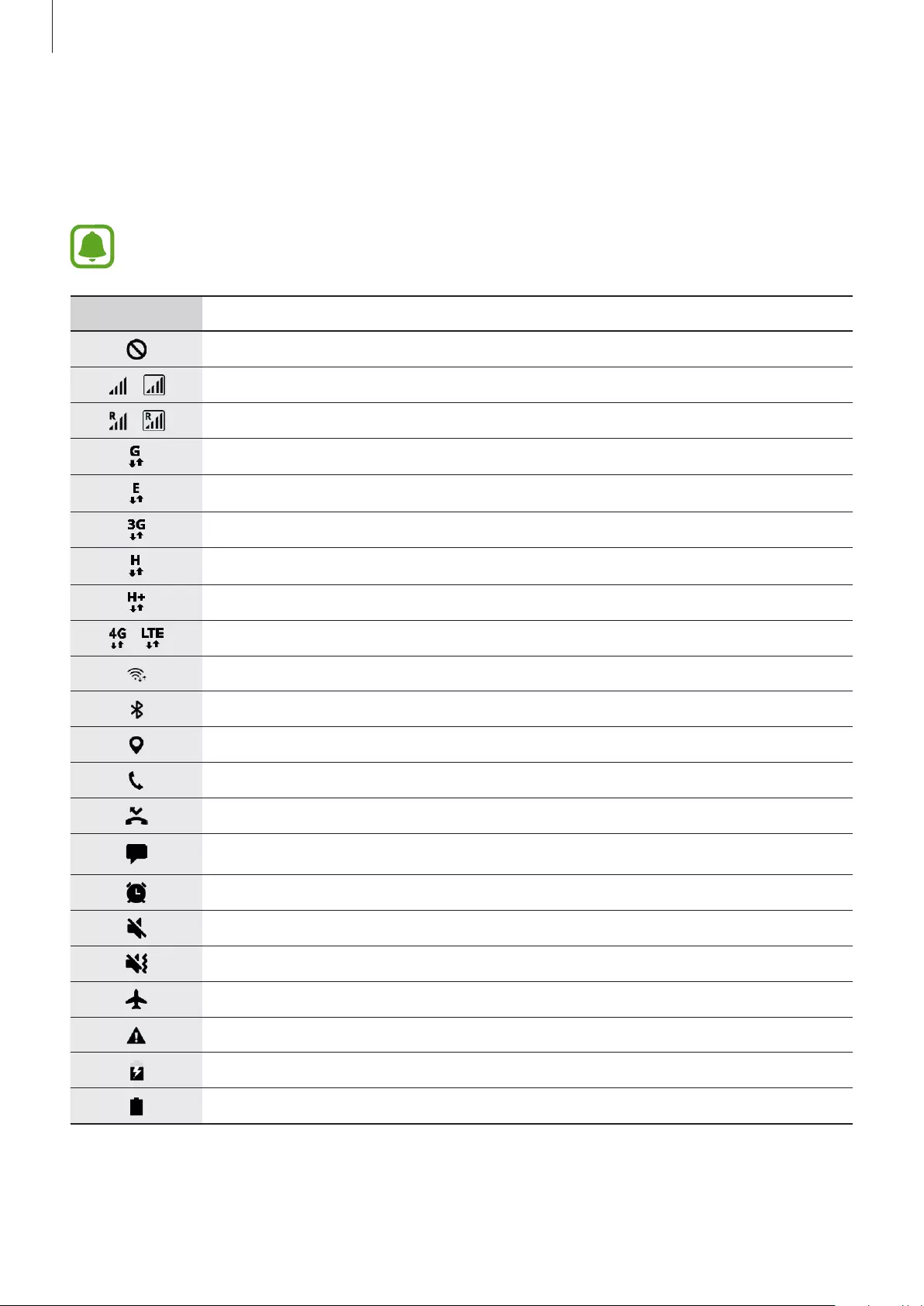
Basics
26
Indicator icons
Indicator icons appear on the status bar at the top of the screen. The icons listed in the table
below are most common.
The status bar may not appear at the top of the screen in some apps. To display the
status bar, drag down from the top of the screen.
Icon Meaning
No signal
/ Signal strength
/ Roaming (outside of normal service area)
GPRS network connected
EDGE network connected
UMTS network connected
HSDPA network connected
HSPA+ network connected
/ LTE network connected
Wi-Fi connected
Bluetooth feature activated
Location services being used
Call in progress
Missed call
New text or multimedia message
Alarm activated
Mute mode activated
Vibration mode activated
Flight mode activated
Error occurred or caution required
Battery charging
Battery power level

Basics
27
Lock screen
Pressing the Power key turns off the screen and locks it. Also, the screen turns off and
automatically locks if the device is not used for a specified period.
The screen is locked with
Swipe
, the default screen lock method.
Press the Power key or the Home key and swipe in any direction to unlock the screen.
To change the screen lock method, on the Apps screen, tap
Settings
→
Lock screen and
security
→
Screen lock type
, and then select a method.
When you set a pattern, PIN or password for the screen lock method, you can protect your
personal information by preventing others from accessing your device. After setting the
screen lock method, the device will require an unlock code whenever unlocking it.
•
Swipe
: Swipe in any direction on the screen to unlock it.
•
Pattern
: Draw a pattern with four or more dots to unlock the screen.
•
PIN
: Enter a PIN with at least four numbers to unlock the screen.
•
Password
: Enter a password with at least four characters, numbers, or symbols to unlock
the screen.
•
None
: Do not set a screen lock method.
You can set your device to perform a factory data reset if you enter the unlock code
incorrectly several times in a row and reach the attempt limit. On the Apps screen, tap
Settings
→
Lock screen and security
→
Secure lock settings
and tap the
Auto factory reset
switch to activate it.
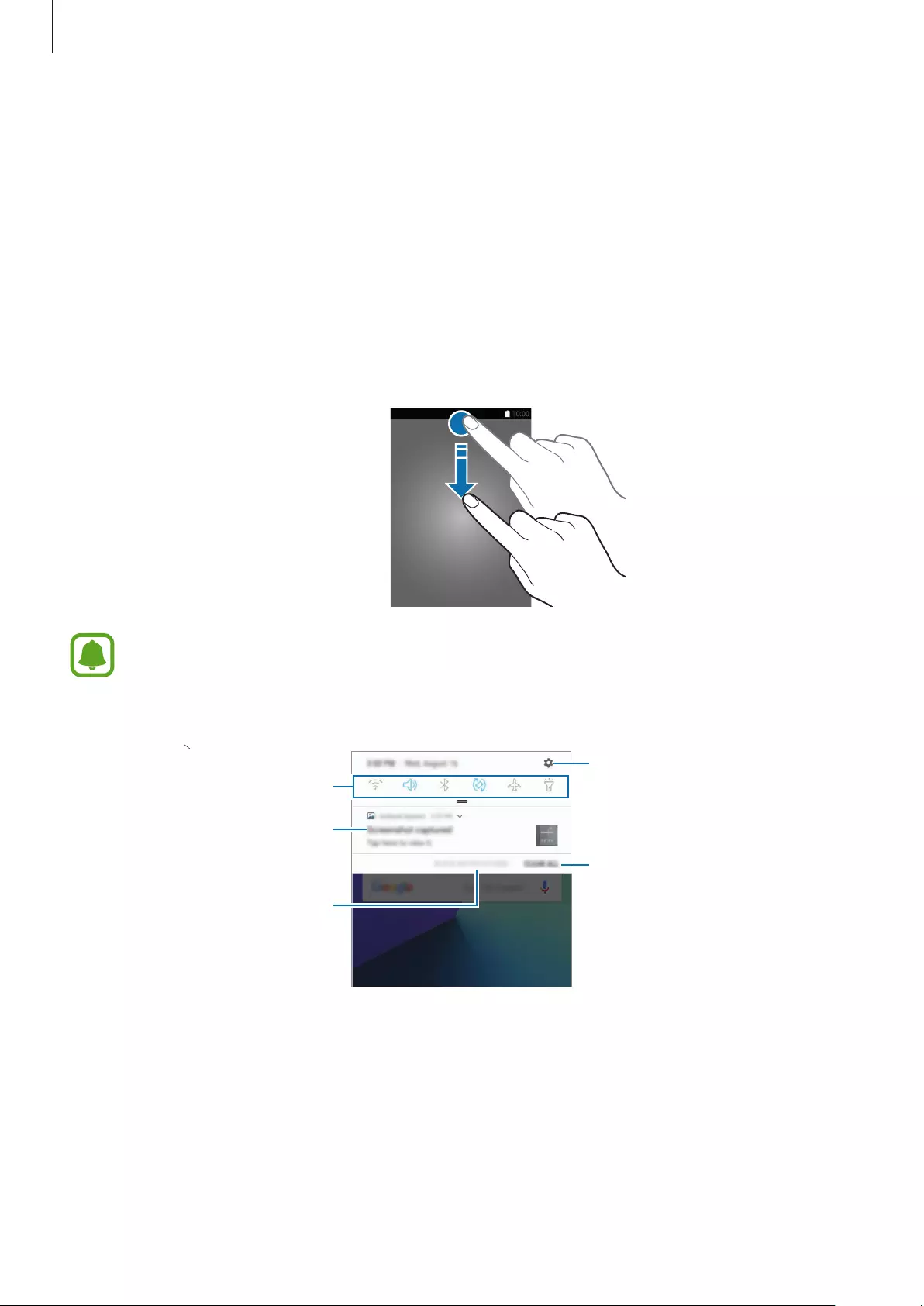
Basics
28
Notification panel
Using the notification panel
When you receive new notifications, such as messages or missed calls, indicator icons appear
on the status bar. To see more information about the icons, open the notification panel and
view the details.
To open the notification panel, drag the status bar downwards. To close the notification panel,
swipe upwards on the screen.
You can open the notification panel, even on the locked screen.
You can use the following functions on the notification panel.
Launch Settings.
Tap a notification and perform
various actions. Clear all notifications.
Quick setting buttons
Block notifications from apps.
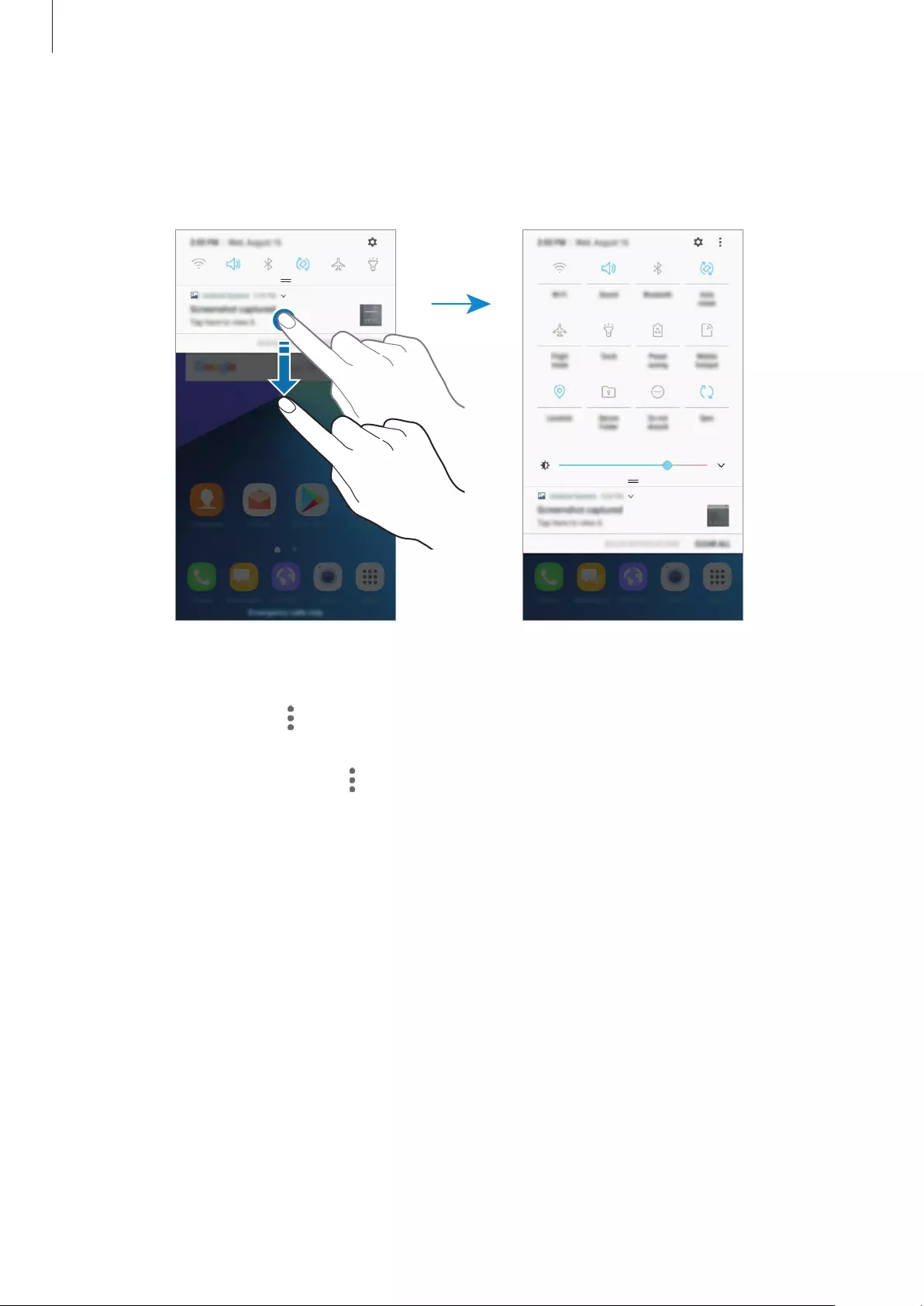
Basics
29
Using quick setting buttons
Tap quick setting buttons to activate certain features. Swipe downwards on the notification
panel to view more buttons.
To change feature settings, tap the text under each button. To view more detailed settings,
tap and hold a button.
To rearrange buttons, tap
→
Reorder buttons
, tap and hold a button, and then drag it to
another location.
To change the button layout, tap
→
Button layout
and select 3x3, 4x3 or 5x3.
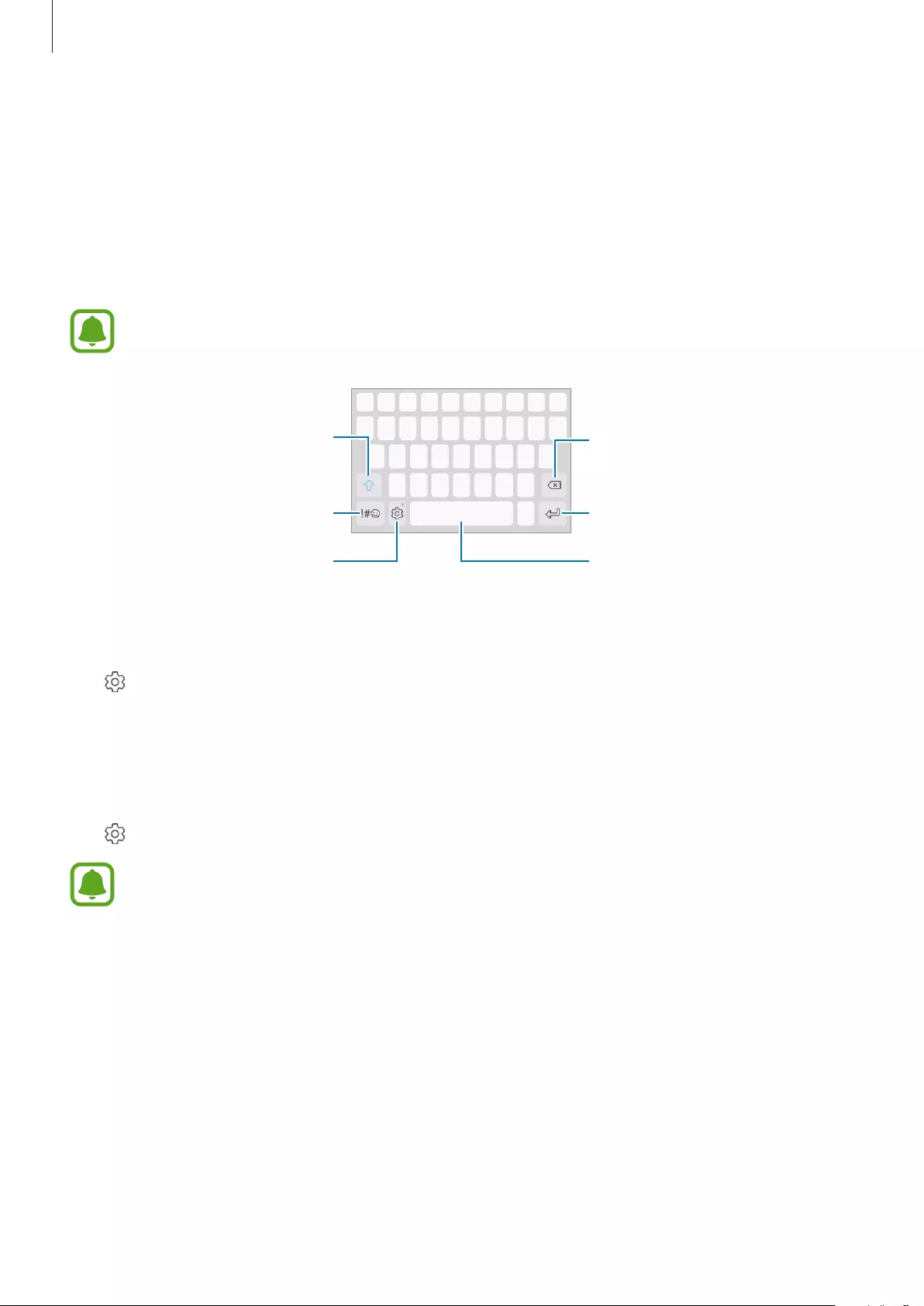
Basics
30
Entering text
Keyboard layout
A keyboard appears automatically when you enter text to send messages, create notes, and
more.
Text entry is not supported in some languages. To enter text, you must change the
input language to one of the supported languages.
Break to the next line.
Delete a preceding character.
Enter symbols.
Enter uppercase. For all caps, tap
it twice.
Change the keyboard settings. Enter a space.
Changing the input language
Tap
→
Languages and types
→
MANAGE INPUT LANGUAGES
, and then select the
languages to use. When you select two or more languages, you can switch between the input
languages by swiping to the left or right on the space key.
Changing the keyboard layout
Tap
→
Languages and types
, select a language, and then select a keyboard layout to use.
On
3x4 keyboard
, a key has three or four characters. To enter a character, tap the
corresponding key repeatedly until the desired character appears.

Basics
31
Additional keyboard functions
Tap and hold to use various functions. Other icons may appear instead of the icon
depending on the last function that was used.
•
: Enter text by voice.
Change the voice input settings.
Start or pause entering text by
voice.
•
: Add an item from the clipboard.
•
: Change the keyboard for one-handed operation.
•
: Change the keyboard settings.
Copying and pasting
1 Tap and hold over text.
2 Drag or to select the desired text, or tap
Select all
to select all text.
3 Tap
Copy
or
Cut
.
The selected text is copied to the clipboard.
4 Tap and hold where the text is to be inserted and tap
Paste
.
To paste text that you have previously copied, tap
Clipboard
and select the text.

Basics
32
Dictionary
Look up definitions for words while using certain features, such as when browsing webpages.
1 Tap and hold over a word that you want to look up.
If the word you want to look up is not selected, drag or to select the desired text.
2 Tap
More
→
Dictionary
on the options list.
If a dictionary is not preinstalled on the device, tap
Move to Manage dictionaries
→
next to a dictionary to download it.
3 View the definition in the dictionary pop-up window.
To switch to the full screen view, tap . Tap the definition on the screen to view more
definitions. In the detailed view, tap to add the word to your favourite words list or tap
Search Web
to use the word as a search term.
Screen capture
Capture a screenshot while using the device.
Press and hold the Home key and the Power key simultaneously. You can view captured
images in
Gallery
.
It is not possible to capture a screenshot while using some apps and features.
Opening apps
On the Home screen or the Apps screen, select an app icon to open it.
To open an app from the list of recently used apps, tap and select a recent app window.
Closing an app
Tap , and tap or drag a recent app window to the left or right to close it. To close all
running apps, tap
CLOSE ALL
.
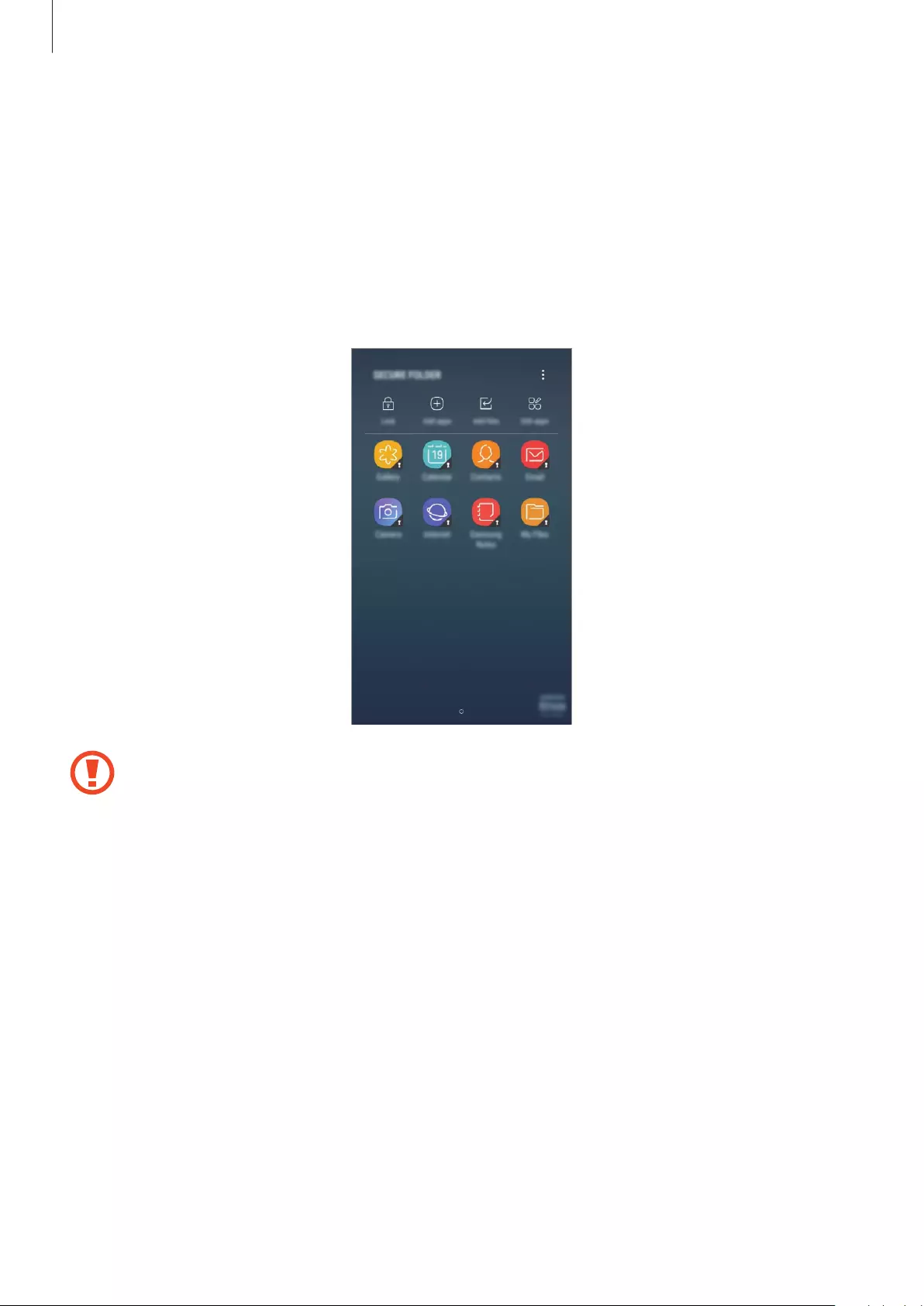
Basics
33
Secure Folder
Introduction
Secure Folder protects your private content and apps, such as photos and notes, from being
accessed by others. You can keep your private content and apps secure even when the device
is unlocked.
Secure Folder is a separate, secured storage area. The data in Secure Folder cannot be
transferred to other devices via unapproved sharing methods, such as USB or Wi-Fi
Direct. Attempting to customize the operating system or modifying software will
cause Secure Folder to be automatically locked and inaccessible. Before saving data in
Secure Folder, make sure to back up a copy of the data in another secure location.

Basics
34
Creating Secure Folder
1 On the Apps screen, tap
Settings
→
Lock screen and security
→
Secure Folder
.
2 Tap
SIGN IN
and sign in to your Samsung account.
3 Select a lock method to use for Secure Folder and follow the on-screen instructions to
complete the setup.
If you forget your Secure Folder unlock code, you can reset it using your Samsung
account. Tap the reset button that appears when an incorrect unlock code is entered,
and enter your Samsung account password.
Setting auto lock for Secure Folder
Set the device to automatically lock Secure Folder when it is not being used.
1 On the Apps screen, tap
Samsung
→
Secure Folder
.
2 Tap
→
Settings
→
Auto lock Secure Folder
.
3 Select a lock option.
To manually lock your Secure Folder, tap
Lock
.
Moving content
Move content, such as photos and contacts, to Secure Folder. The following actions are an
example of moving an image from the default storage to Secure Folder.
1 On the Apps screen, tap
Gallery
.
2 Select an image and tap
→
Move to Secure Folder
.
The selected items will be moved to the corresponding app in Secure Folder.
You can move content from Secure Folder to the corresponding app in the default
storage. Select an item and tap
→
Move out of Secure Folder
.

Basics
35
Adding apps
Add an app to use in Secure Folder.
1 On the Apps screen, tap
Samsung
→
Secure Folder
.
2 Tap
Add apps
.
3 Tick one or more apps installed on the device and tap
DONE
.
To install apps from
Play Store
, tap
DOWNLOAD FROM PLAY STORE
.
To install apps from
Galaxy Apps
, tap
DOWNLOAD FROM GALAXY APPS
.
Removing apps from Secure Folder
Tap
Edit apps
, tick apps, and then tap
Uninstall
.
Adding accounts
Add your Samsung and Google accounts, or other accounts, to sync with the apps in Secure
Folder.
1 On the Apps screen, tap
Samsung
→
Secure Folder
.
2 Tap
→
Settings
→
Accounts
→
Add account
.
3 Select an account service.
4 Follow the on-screen instructions to complete the account setup.
Hiding Secure Folder
You can hide the Secure Folder shortcut from the Apps screen.
1 On the Apps screen, tap
Samsung
→
Secure Folder
.
2 Tap
→
Settings
and tap the
Show Secure Folder
switch to deactivate it.
To show the Secure Folder shortcut again, open the Apps screen, tap
Settings
→
Lock screen and security
→
Secure Folder
, and then tap the
Show Secure Folder
switch to
activate it.

Basics
36
Backing up and restoring Secure Folder
Back up content and apps in Secure Folder to Samsung Cloud using your Samsung account
and restore them later.
Backing up data
1 On the Apps screen, tap
Samsung
→
Secure Folder
.
2 Tap
→
Settings
→
Backup and restore
.
3 Tap
Add account
and register and sign in to your Samsung account.
4 Tap
Back up Secure Folder data
.
5 Tick items you want to back up and tap
BACK UP NOW
.
Data will be backed up to Samsung Cloud.
Restoring data
1 On the Apps screen, tap
Samsung
→
Secure Folder
.
2 Tap
→
Settings
→
Backup and restore
.
3 Tap
Restore backup
.
4 Select a device and the data types you want to restore and tap
RESTORE
.
Backed up data will be restored to your device.
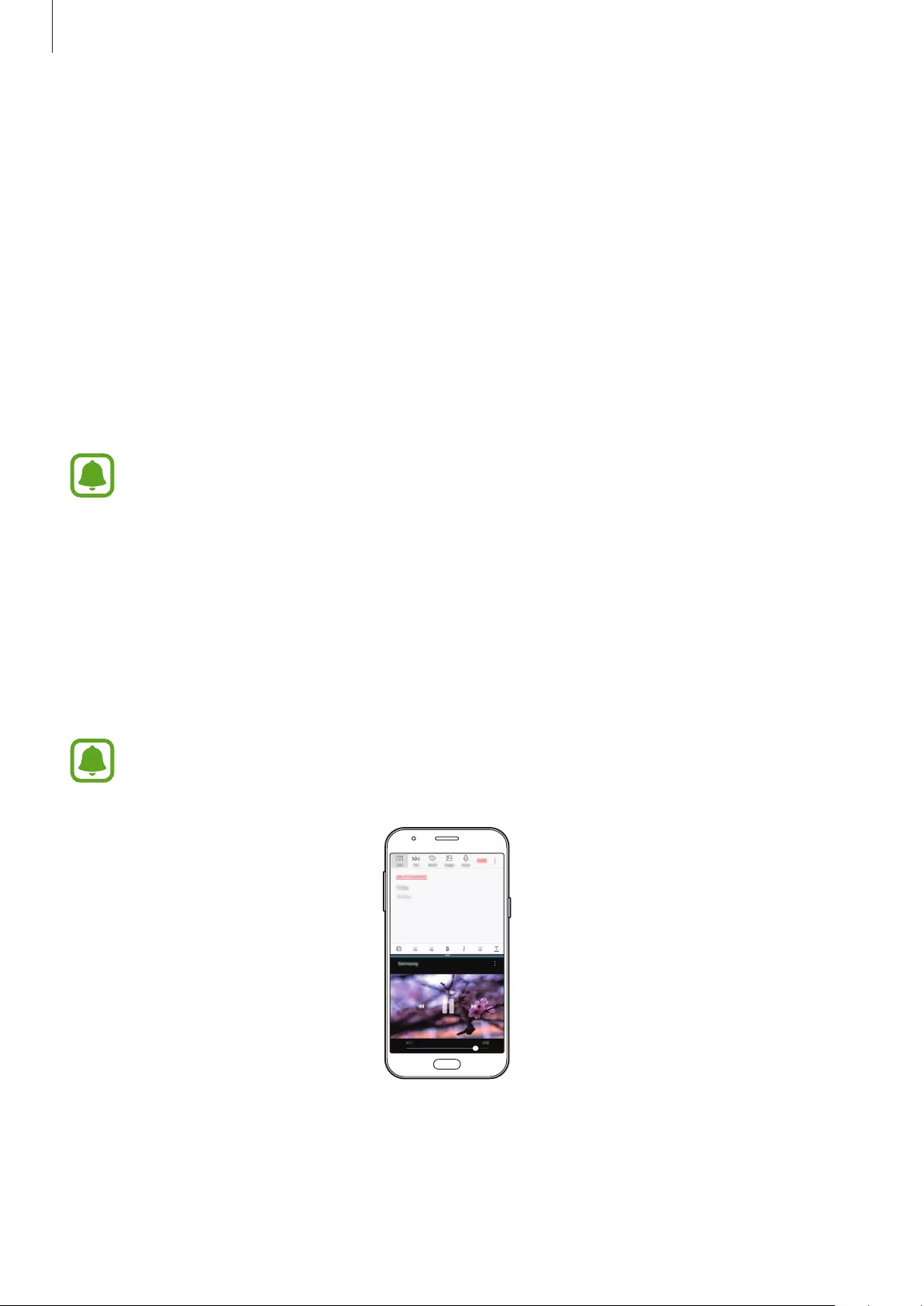
Basics
37
Uninstalling Secure Folder
You can uninstall Secure Folder, including the content and apps in it.
1 On the Apps screen, tap
Settings
→
Lock screen and security
→
Secure Folder
→
Uninstall
.
2 Tap
UNINSTALL
.
To back up content before uninstalling Secure Folder, tick
Move media files out of
Secure Folder
and tap
UNINSTALL
. To access data backed from Secure Folder, open the
Samsung
folder, launch the
My Files
app, and then tap
Internal storage
→
Secure Folder
.
Notes saved in
Samsung Notes
will not be backed up.
Multi window
Introduction
Multi window lets you run two apps at the same time in the split screen view.
Some apps may not support this feature.
Split screen view
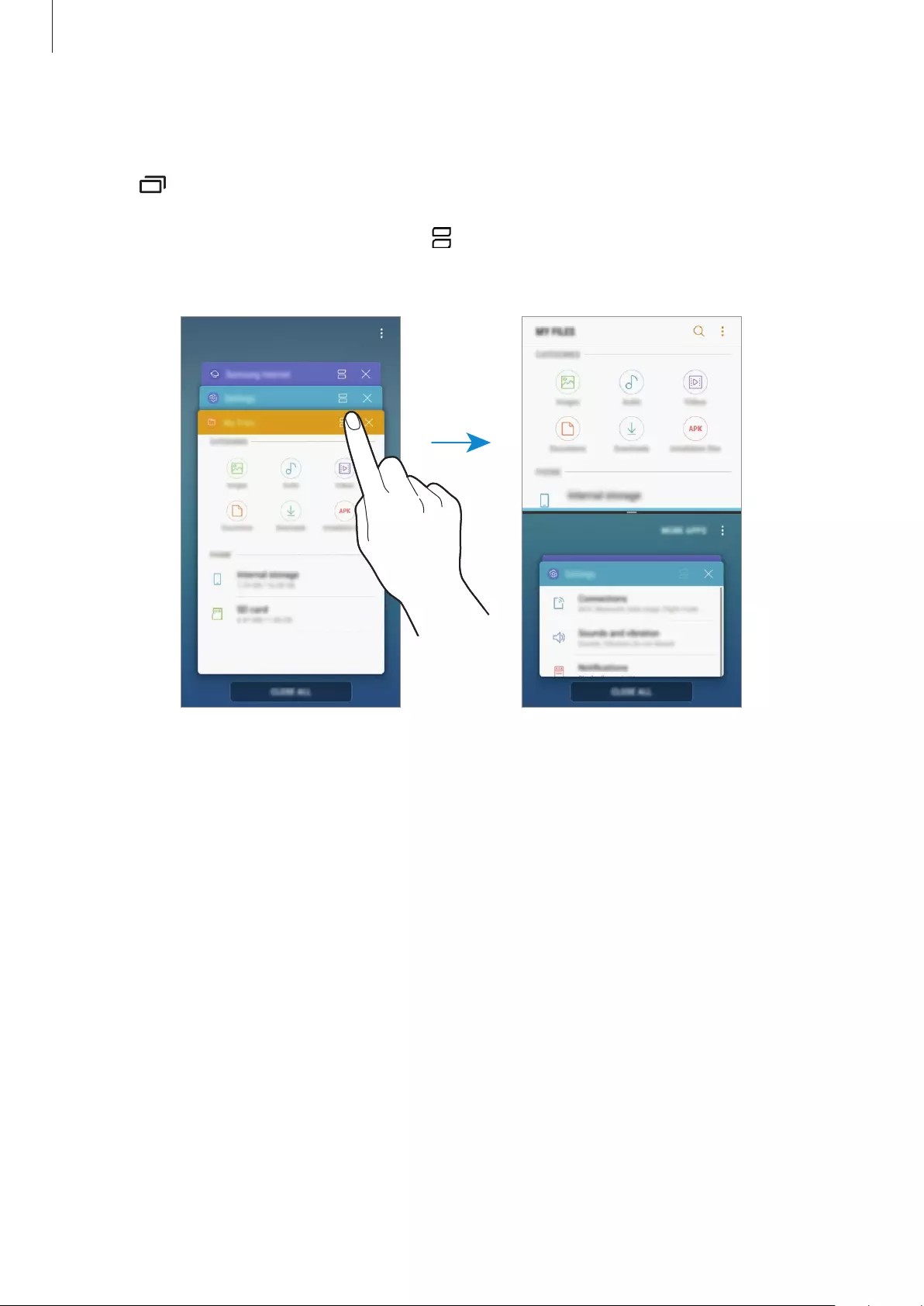
Basics
38
Split screen view
1 Tap to open the list of recently used apps.
2 Swipe upwards or downwards and tap on a recent app window.
The selected app will launch in the upper window.
3 In the lower window, swipe upwards or downwards to select another app to launch.
To launch apps not in the list of recently used apps, tap
MORE APPS
and select an app.
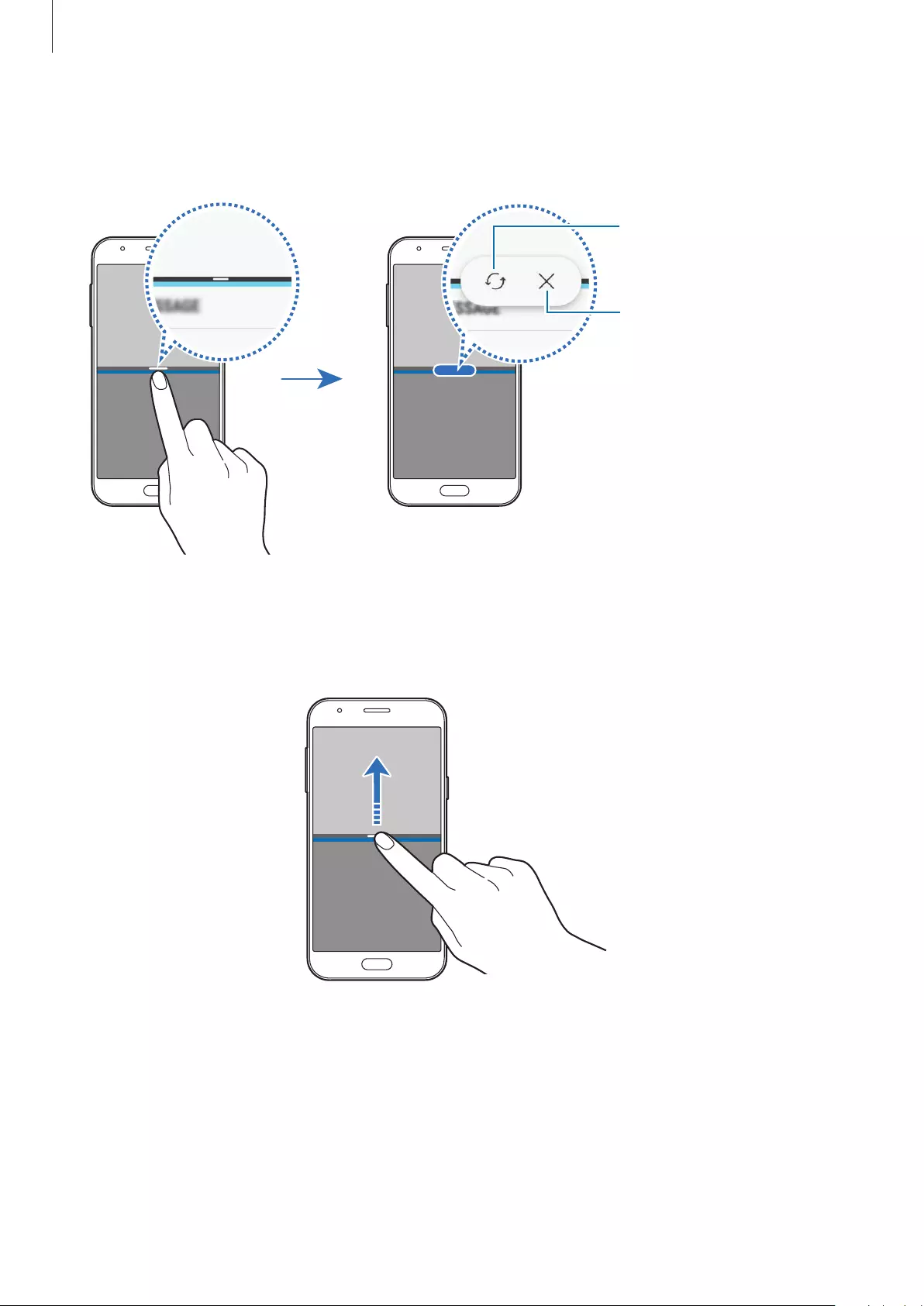
Basics
39
Using additional options
Tap the bar between the app windows to access additional options.
Switch locations between
app windows.
Close the currently
selected app.
Adjusting the window size
Drag the bar between the app windows up or down to adjust the size of the windows.
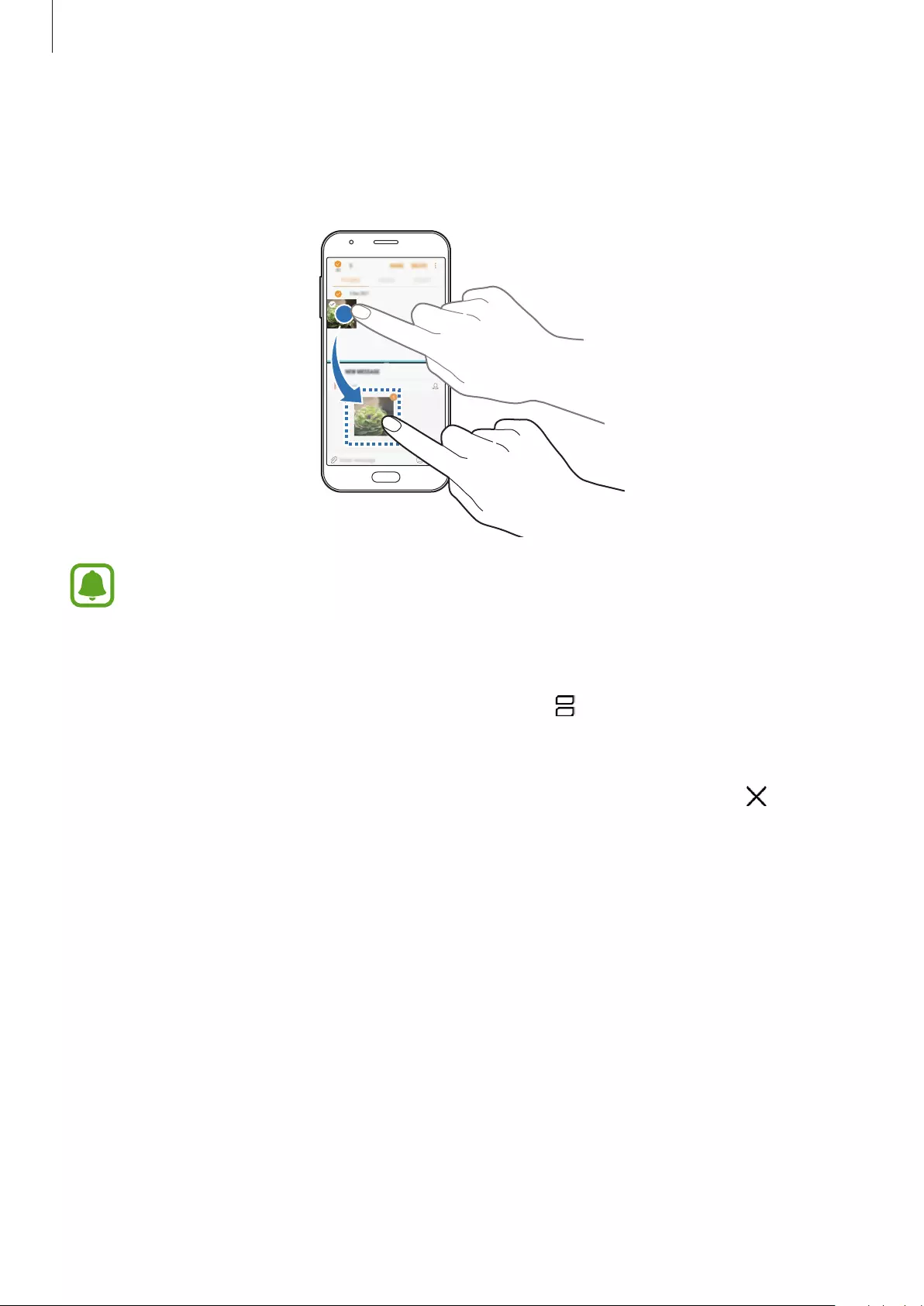
Basics
40
Sharing text or images between windows
Drag and drop text or copied images from one window to another. Tap and hold an item in
the selected window and drag it to a location in another window.
Some apps may not support this feature.
Minimizing the split screen view
Press the Home key to minimize the split screen view. The icon will appear on the status
bar. The app in the lower window will close and the app in the upper window will remain
active in the minimized split screen view.
To close the minimized split screen view, open the notification panel and tap the icon on
the Multi window notification.
Maximizing a window
Tap an app window and drag the bar between the app windows to the top or bottom edge of
the screen.

Basics
41
Samsung account
Introduction
Your Samsung account is an integrated account service that allows you to use a variety of
Samsung services provided by mobile devices, TVs, and the Samsung website. Once your
Samsung account has been registered, you can use apps provided by Samsung, without
signing in to your account.
Create your Samsung account with your email address.
To check the list of services that can be used with your Samsung account, visit
account.samsung.com. For more information on Samsung accounts, open the Apps screen
and tap
Settings
→
Cloud and accounts
→
Accounts
→
Samsung account
→
Help
.
Registering your Samsung account
Registering a new Samsung account
If you do not have a Samsung account, you should create one.
1 On the Apps screen, tap
Settings
→
Cloud and accounts
→
Accounts
→
Add account
.
2 Tap
Samsung account
→
CREATE ACCOUNT
.
3 Follow the on-screen instructions to complete creating your account.
Registering an existing Samsung account
If you already have a Samsung account, register it to the device.
1 On the Apps screen, tap
Settings
→
Cloud and accounts
→
Accounts
→
Add account
.
2 Tap
Samsung account
→
SIGN IN
.
3 Enter your email address and password, and then tap
SIGN IN
.
If you forget your account information, tap
Forgotten your ID or password?
You can find
your account information when you enter the required information and security code
displayed that is on the screen.

Basics
42
Removing your Samsung account
When you remove your registered Samsung account from the device, your data, such as
contacts or events, will also be removed.
1 On the Apps screen, tap
Settings
→
Cloud and accounts
→
Accounts
.
2 Tap
Samsung account
→
→
Remove account
→
OK
.
3 Enter your Samsung account password and then tap
REMOVE ACCOUNT
.
Transferring data from your previous device
You can transfer contacts, images, and other data from a previous device to your device via
Smart Switch or Samsung Cloud.
•
This feature may not be supported on some devices or computers.
•
Limitations apply. Visit www.samsung.com/smartswitch for details. Samsung
takes copyright seriously. Only transfer content that you own or have the right to
transfer.
Transferring data via Smart Switch
You can transfer data from a previous device to your device via Samsung Smart Switch.
The following versions of Samsung Smart Switch are available.
•
Mobile version
: Transfer data between mobile devices. You can download the app from
Galaxy Apps
or
Play Store
.
•
Computer version
: Transfer data between your device and a computer. You can
download the app from www.samsung.com/smartswitch.
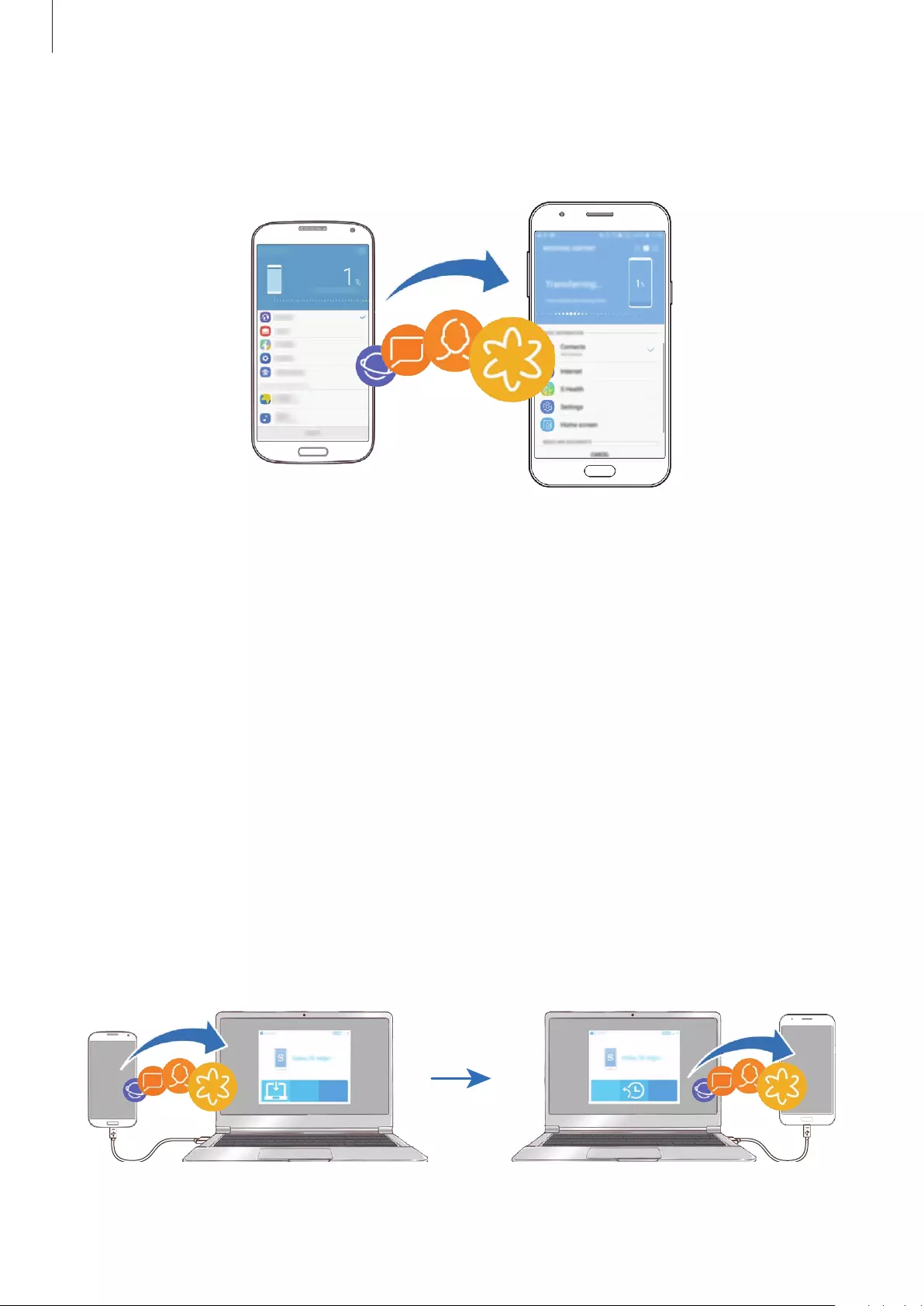
Basics
43
Transferring data wirelessly via Wi-Fi Direct
Transfer data from your previous device to your device wirelessly via Wi-Fi Direct.
1 On both devices, download and install Smart Switch from
Galaxy Apps
or
Play Store
.
2 Place the devices near each other.
3 Launch
Smart Switch
on both devices.
4 On the previous device, tap
WIRELESS
→
SEND
→
CONNECT
.
5 On your device, tap
WIRELESS
→
RECEIVE
and select the previous device type.
6 Follow the on-screen instructions to transfer data from your previous device.
Transferring backup data from a computer
Transfer data between your device and a computer. You must download the Smart Switch
computer version app from www.samsung.com/smartswitch. Back up data from your
previous device to a computer and import the data to your device.

Basics
44
1 On the computer, visit www.samsung.com/smartswitch to download Smart Switch.
2 On the computer, launch Smart Switch.
If your previous device is not a Samsung device, back up data to a computer using a
program provided by the device’s manufacturer. Then, skip to the fifth step.
3 Connect your previous device to the computer using the USB cable.
4 On the computer, follow the on-screen instructions to back up data from the device.
Then, disconnect your previous device from the computer.
5 Connect your device to the computer using the USB cable.
6 On the computer, follow the on-screen instructions to transfer data to your device.
Transferring data via Samsung Cloud
Back up data from your previous device to Samsung Cloud and restore the data to your
device. You must register and sign in to your Samsung account to use Samsung Cloud. Refer
to Samsung account for more information.
1 On the previous device, back up the data to your Samsung account.
2 On your device, launch the
Settings
app and tap
Cloud and accounts
→
Samsung Cloud
→
Restore
.
3 Tap and select the previous device from the devices list.
4 Tick the data types you want to restore and tap
RESTORE NOW
.

Basics
45
Device and data management
Connecting the device to a computer for data transfer
Move audio, video, image, or other types of files from the device to the computer, or vice
versa.
Do not disconnect the USB cable from the device when you are transferring files.
Doing so may cause data loss or device damage.
The devices may not connect properly if they are connected via a USB hub. Directly
connect the device to the computer’s USB port.
1 Connect the device to the computer using the USB cable.
2 Open the notification panel, and then tap
Transferring media files via USB
→
Transfer media files
.
If the computer cannot recognize your device, tap
Transfer images
.
3 Tap
ALLOW
to permit the computer to access your device’s data.
When the computer recognizes your device, the device will appear in My PC.
4 Transfer files between your device and the computer.
Updating the device
The device can be updated to the latest software.
Updating over the air
The device can be directly updated to the latest software by the firmware over-the-air (FOTA)
service.
On the Apps screen, tap
Settings
→
Software update
→
Download updates manually
.
When you tap the
Download updates automatically
switch to activate it, updates
will be downloaded when the device is connected to a Wi-Fi network.

Basics
46
Updating with Smart Switch
Connect the device to a computer and update the device to the latest software.
1 On the computer, visit www.samsung.com/smartswitch to download and install Smart
Switch.
2 On the computer, launch Smart Switch.
3 Connect the device to the computer using a USB cable.
4 If a software update is available, follow the on-screen instructions to update the device.
•
Do not turn off the computer or disconnect the USB cable while the device is
updating.
•
While updating the device, do not connect other media devices to the computer.
Doing so may interfere with the update process. Before updating, disconnect all
other media devices from the computer.
Backing up and restoring data
Keep your personal information, app data, and settings safe on your device. You can back up
your sensitive information and access it later. You must sign in to your Google or Samsung
account to back up or restore data. Refer to Samsung account and Accounts for more
information.
Using a Samsung account
On the Apps screen, tap
Settings
→
Cloud and accounts
→
Backup and restore
→
Backup settings
for the Samsung account, tap the switches next to the items you want to
back up to activate them, and then tap
BACK UP NOW
.
Data will be backed up to Samsung Cloud. Refer to Samsung Cloud for more information.
To set the device to automatically back up data, tap the
AUTO BACK UP
switch to activate it.
To restore backup data from Samsung Cloud using a Samsung account, tap
Restore
. Select a
device and the data types you want to restore and tap
RESTORE NOW
. The selected data will
be restored to your device.

Basics
47
Using a Google account
On the Apps screen, tap
Settings
→
Cloud and accounts
→
Backup and restore
and tap the
Back up my data
switch for the Google account to activate it. Tap
Backup account
and select
an account as the backup account.
To restore data using a Google account, tap the
Automatic restore
switch to activate it. When
you reinstall apps, backed up settings and data will be restored.
Performing a data reset
Delete all settings and data on the device. Before performing a factory data reset, ensure you
back up all important data stored on the device. Refer to Backing up and restoring data for
more information.
On the Apps screen, tap
Settings
→
General management
→
Reset
→
Factory data reset
→
RESET
→
DELETE ALL
. The device automatically restarts.
Sharing features
Share content by using various sharing options. The following actions are an example of
sharing images.
You may incur additional charges when sharing files via the mobile network.
1 Tap
Gallery
on the Apps screen.
2 Select an image.
3 Tap
Share
and select a sharing method, such as Bluetooth and email.
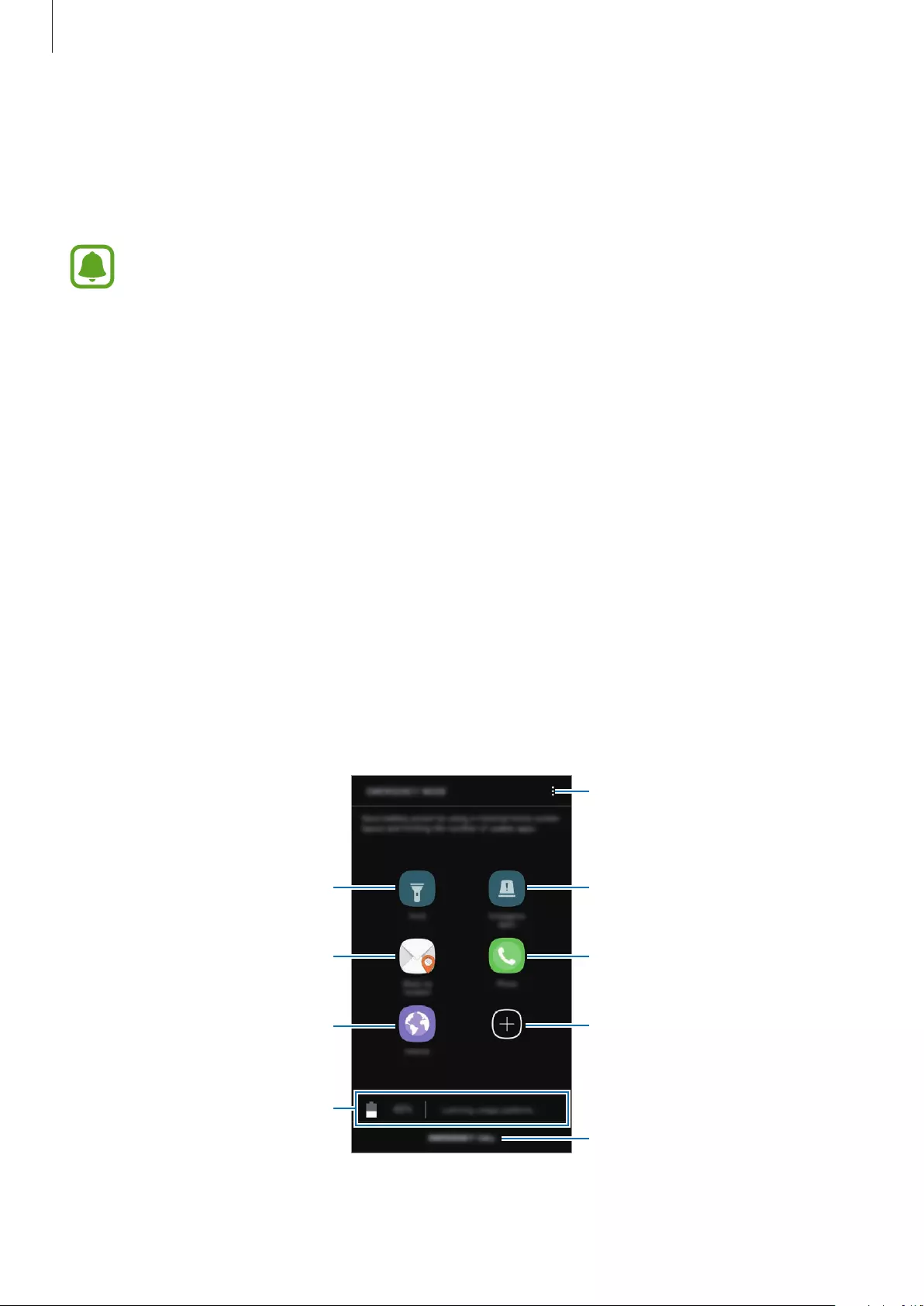
Basics
48
You can also use the following option:
•
Link Sharing
: Upload content to the Samsung storage server and share the link and
the access code with others, even if they are not saved in your contacts list. To use this
feature, your phone number must be verified.
When you have a communication or sharing history, the people you contacted will
appear on the sharing options panel. To directly share content with them via the
corresponding app, select a person’s icon. If the feature is not activated, open the
Apps screen, tap
Settings
→
Advanced features
, and then tap the
Direct share
switch to activate it.
4 Follow the on-screen instructions to share the image with others.
When the image is sent to the recipients’ devices, a notification will appear on their devices.
Tap the notification to view or download the image.
Emergency mode
You can switch the device to emergency mode to reduce battery consumption. Some apps
and functions will be restricted. In emergency mode, you can make an emergency call, send
your current location information to others, sound an emergency alarm, and more.
Press and hold the Power key, and then tap
Emergency mode
.
Add more apps to use.
Make an emergency call.
Remaining battery power and
usage time left
Turn on the flash.
Make a call.
Send your current location
information in a message.
Browse the Internet.
Access additional options.
Sound alarms.

Basics
49
The usage time left shows the time remaining before the battery power runs
out. Usage time left may vary depending on your device settings and operating
conditions.
Deactivating emergency mode
To deactivate emergency mode, tap
→
Disable Emergency mode
. Alternatively, press and
hold the Power key, and then tap
Emergency mode
.

50
Applications
Installing or uninstalling apps
Galaxy Apps
Purchase and download apps. You can download apps that are specialized for Samsung
Galaxy devices.
Tap
Galaxy Apps
on the Apps screen.
This app may not be available depending on the region or service provider.
Installing apps
Browse apps by category or tap the search field to search for a keyword.
Select an app to view information about it. To download free apps, tap
INSTALL
. To purchase
and download apps where charges apply, tap the price and follow the on-screen instructions.
To change the auto update settings, tap
→
Settings
→
Auto update apps
, and
then select an option.
Play Store
Purchase and download apps.
Tap
Play Store
on the Apps screen.
Installing apps
Browse apps by category or search for apps by keyword.
Select an app to view information about it. To download free apps, tap
INSTALL
. To purchase
and download apps where charges apply, tap the price and follow the on-screen instructions.
To change the auto update settings, tap
→
Settings
→
Auto-update apps
, and
then select an option.

Applications
51
Managing apps
Uninstalling or disabling apps
On the Apps screen, tap
→
Edit
. The icon appears on the apps that you can disable
or uninstall. Select an app and tap
DISABLE
or
OK
. Alternatively, on the Apps screen, tap
Settings
→
Apps
, select an app, and then tap
DISABLE
or
UNINSTALL
.
•
DISABLE
: Disable selected default apps that cannot be uninstalled from the device.
•
UNINSTALL
: Uninstall downloaded apps.
Enabling apps
On the Apps screen, tap
Settings
→
Apps
→
→
Disabled
, select an app, and then tap
ENABLE
.
Setting app permissions
For some apps to operate properly, they may need permission to access or use information
on your device. When you open an app, a pop-up window may appear and request access to
certain features or information. Tap
ALLOW
on the pop-up window to grant permissions to
the app.
To view your app permission settings, open the Apps screen and tap
Settings
→
Apps
.
Select an app and tap
Permissions
. You can view the app’s permissions list and change its
permissions.
To view or change app permission settings by permission category, open the Apps screen,
tap
Settings
→
Apps
→
→
App permissions
. Select an item and tap the switches next to
apps to grant permissions.
If you do not grant permissions to apps, the basic features of the apps may not
function properly.
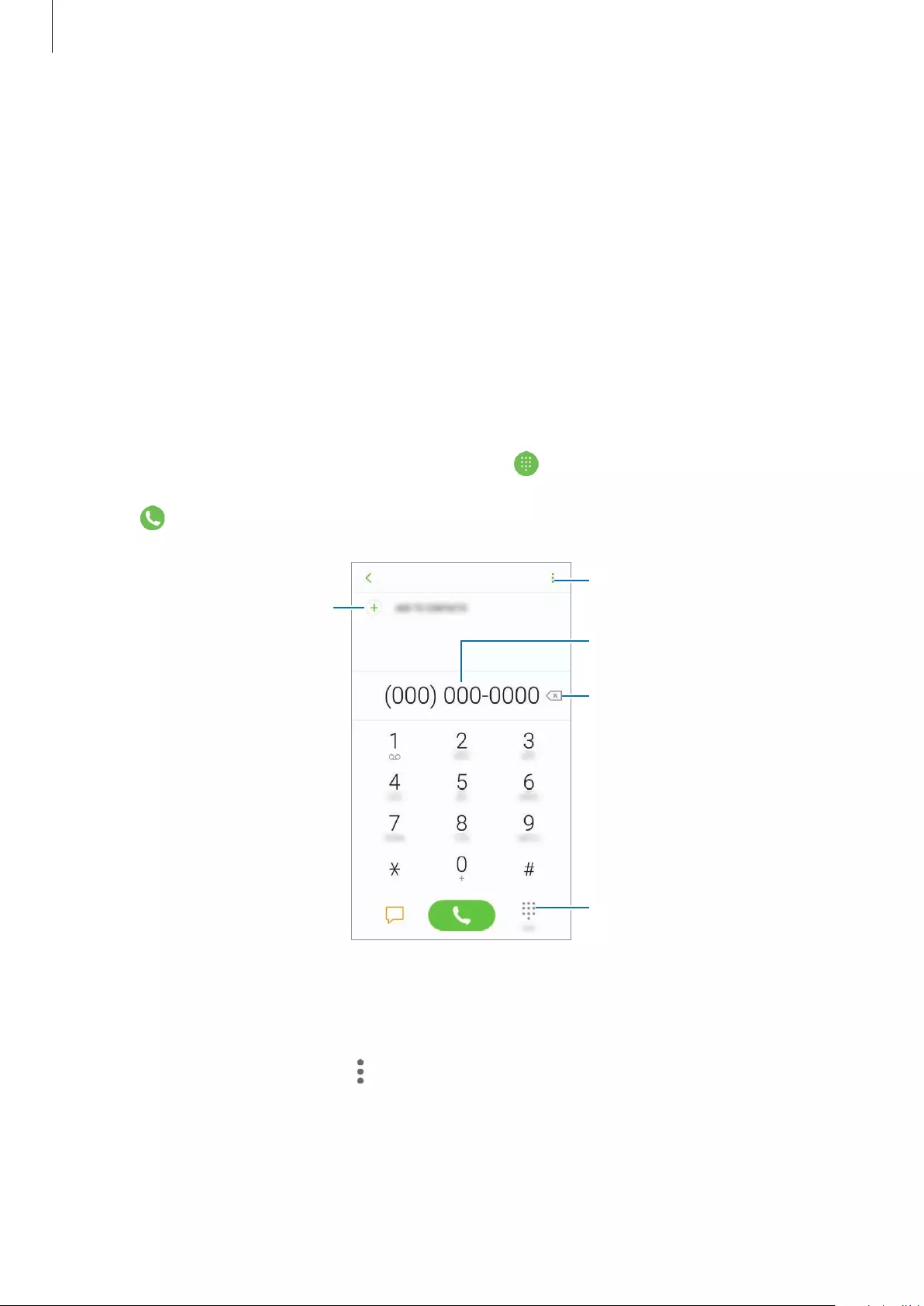
Applications
52
Phone
Introduction
Make or answer voice calls.
Making calls
1 Tap
Phone
on the Apps screen.
2 Enter a phone number.
If the keypad does not appear on the screen, tap to open the keypad.
3 Tap to make a voice call.
Add the number to the contacts
list. Preview the phone number.
Hide the keypad.
Delete a preceding character.
Access additional options.
Using speed dial
Set speed dial numbers to quickly make calls.
To set a number to speed dial, tap
→
Speed dial
, select a speed dial number, and then add a
phone number.

Applications
53
To make a call, tap and hold a speed dial number on the keypad. For speed dial numbers 10
and up, tap the first digit(s) of the number, and then tap and hold the last digit.
For example, if you set the number 123 as a speed dial number, tap 1, tap 2, and then tap and
hold 3.
Making calls from the locked screen
On the locked screen, drag outside the large circle.
Making calls from call logs, contacts list, or places
Tap
RECENTS
or
CONTACTS
, and then swipe to the right on a contact or a phone number to
make a call.
Making an international call
1 Tap to open the keypad if the keypad does not appear on the screen.
2 Tap and hold 0 until the + sign appears.
3 Enter the country code, area code, and phone number, and then tap .
Receiving calls
Answering a call
When a call comes in, drag outside the large circle.
Rejecting a call
When a call comes in, drag outside the large circle.
To send a message when rejecting an incoming call, drag the rejection message bar upwards.
To create various rejection messages, open the Apps screen, tap
Phone
→
→
Settings
→
Quick decline messages
, enter a message, and then tap .
Missed calls
If a call is missed, the icon appears on the status bar. Open the notification panel to view
the list of missed calls. Alternatively, on the Apps screen, tap
Phone
→
RECENTS
to view
missed calls.

Applications
54
Blocking phone numbers
Block calls from specific numbers added to your block list.
1 On the Apps screen, tap
Phone
→
→
Settings
→
Block numbers
.
2 Tap , tick contacts, and then tap
DONE
.
To manually enter a number, tap
Enter phone number
, enter a phone number, and then
tap .
When blocked numbers try to contact you, you will not receive notifications. The calls will be
logged in the call log.
You can also block incoming calls from people that do not show their caller ID. Tap the
Block unknown callers
switch to activate the feature.
Options during calls
During a voice call
The following actions are available:
•
: Access additional options.
•
Add call
: Dial a second call.
•
Extra volume
: Increase the volume.
•
Bluetooth
: Switch to a Bluetooth headset if it is connected to the device.
•
Speaker
: Activate or deactivate the speakerphone. When using the speakerphone, keep
the device away from your ears.
•
Keypad
/
Hide
: Open or close the keypad.
•
Mute
: Turn off the microphone so that the other party cannot hear you.
•
: End the current call.

Applications
55
Smart Call
Easily report or block spam calls.
To activate:
1 On the Apps screen, tap
Phone
→
→
Settings
→
Caller ID and spam protection
.
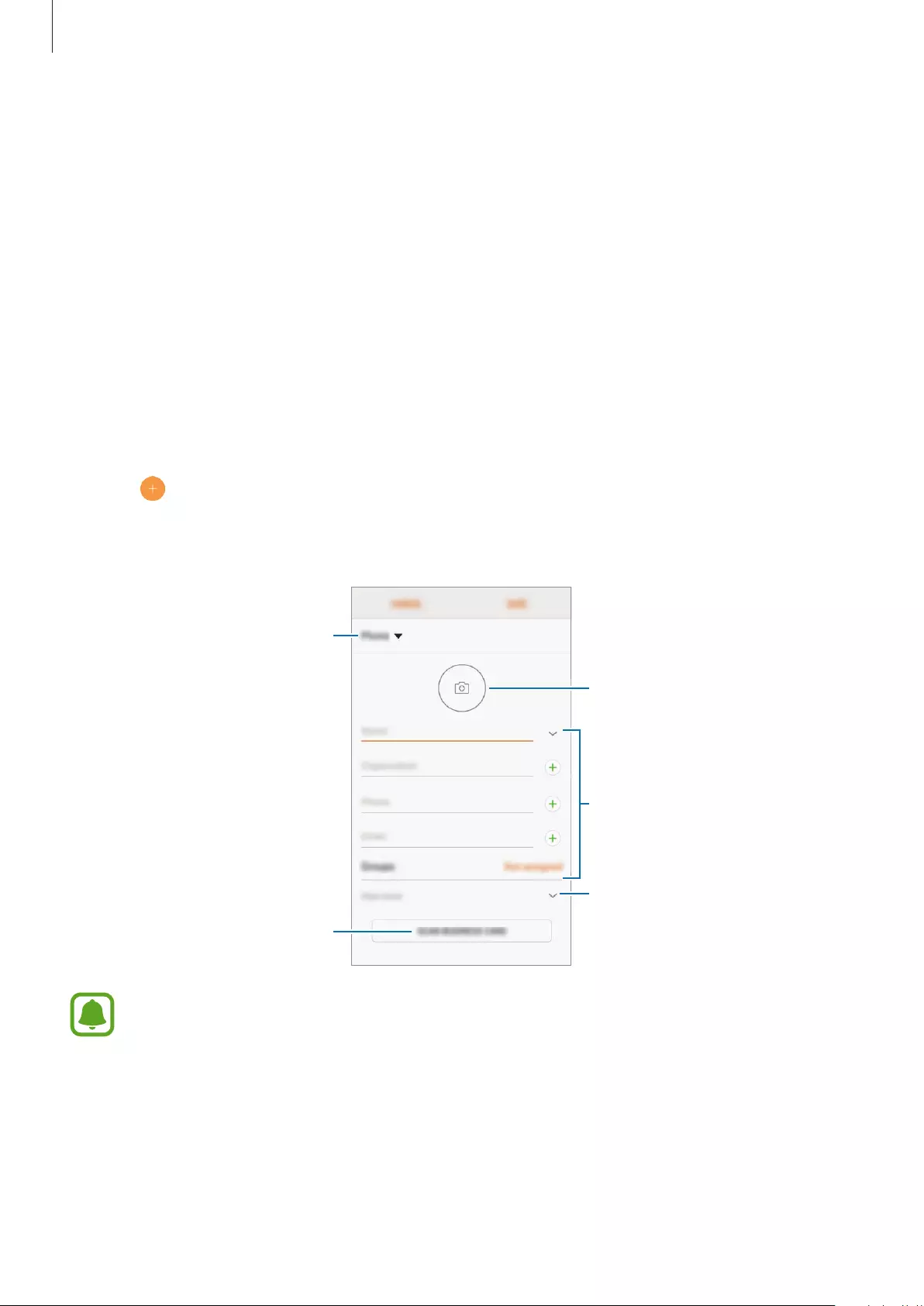
Applications
56
Contacts
Introduction
Create new contacts or manage contacts on the device.
Adding contacts
Creating a new contact
1 Tap
Contacts
on the Apps screen.
2 Tap and select a storage location.
3 Enter contact information.
Select a storage location.
Add an image.
Open more information fields.
Scan contact information from a
business card.
Enter contact information.
Depending on the selected storage location, the types of information you can save
may vary.
4 Tap
SAVE
.

Applications
57
Adding a phone number to Contacts from the keypad
1 Tap
Phone
on the Apps screen.
2 Enter the number and tap
ADD TO CONTACTS
.
If the keypad does not appear on the screen, tap to open the keypad.
3 Tap
Create contact
to create a new contact, or tap
Update existing
to add the number to
an existing contact.
Adding a phone number to Contacts from the calls list
1 On the Apps screen, tap
Phone
→
RECENTS
.
2 Tap a caller’s image, or tap a phone number
→
Details
.
3 Tap
CREATE CONTACT
to create a new contact, or tap
UPDATE EXISTING
to add the
number to an existing contact.
Importing contacts
Add contacts by importing them from other storages to your device.
1 Tap
Contacts
on the Apps screen.
2 Tap
→
Settings
→
Import/Export contacts
→
IMPORT
.
3 Select a storage location to import contacts from.
4 Tick VCF files or contacts to import and tap
DONE
.
5 Select a storage location to save contacts to and tap
IMPORT
.
Syncing contacts with your web accounts
Sync your device contacts with online contacts saved in your web accounts, such as your
Samsung account.
On the Apps screen, tap
Settings
→
Cloud and accounts
→
Accounts
, select an account
name, select the account to sync with, and then tap
Contacts (Samsung account)
or
Sync Contacts
.

Applications
58
Searching for contacts
On the Apps screen, tap
Contacts
.
Use one of the following search methods:
•
Scroll up or down the contacts list.
•
Drag a finger along the index at the right side of the contacts list to scroll through it
quickly.
•
Tap the search field at the top of the contacts list and enter search criteria.
Tap the contact’s image, or tap the contact’s name
→
Details
. Then take one of the following
actions:
•
: Add to favourite contacts.
•
: Make a voice call.
•
: Compose a message.
•
: Compose an email.
Sharing contacts
You can share contacts with others by using various sharing options.
1 Tap
Contacts
on the Apps screen.
2 Tap
→
Share
.
3 Tick contacts and tap
SHARE
.
4 Select a sharing method.
Saving and sharing profile
Share your profile information, such as your photo and status message, with others using the
profile sharing feature.
•
This feature may not be available depending on the region or service provider.
•
This feature is only available for contacts who have activated the profile sharing
feature on their device.

Applications
59
1 Tap
Contacts
on the Apps screen.
2 Select your profile.
3 Tap
EDIT
, edit your profile, and tap
SAVE
.
4 Tap
Profile sharing
, and then tap the switch to activate it.
To use this feature, your phone number must be verified. You can view your contacts’ updated
profile information in
Contacts
.
To set additional items to share, tap
Shared information
and select items.
To set a contact group to share your profile with, tap
Share with
and select an option.
Merging duplicate contacts
When you import contacts from other storages, or sync or move contacts to other accounts,
your contacts list may include duplicate contacts. Merge duplicate contacts into one to
streamline your contacts list.
1 Tap
Contacts
on the Apps screen.
2 Tap
→
Settings
→
Merge duplicate contacts
.
3 Tick contacts and tap
MERGE
.
Deleting contacts
1 Tap
Contacts
on the Apps screen.
2 Tap
→
Delete
.
3 Tick contacts and tap
DELETE
.
To delete contacts one by one, open the contacts list and tap a contact’s image or tap a
contact’s name
→
Details
. Then tap
→
Delete
.
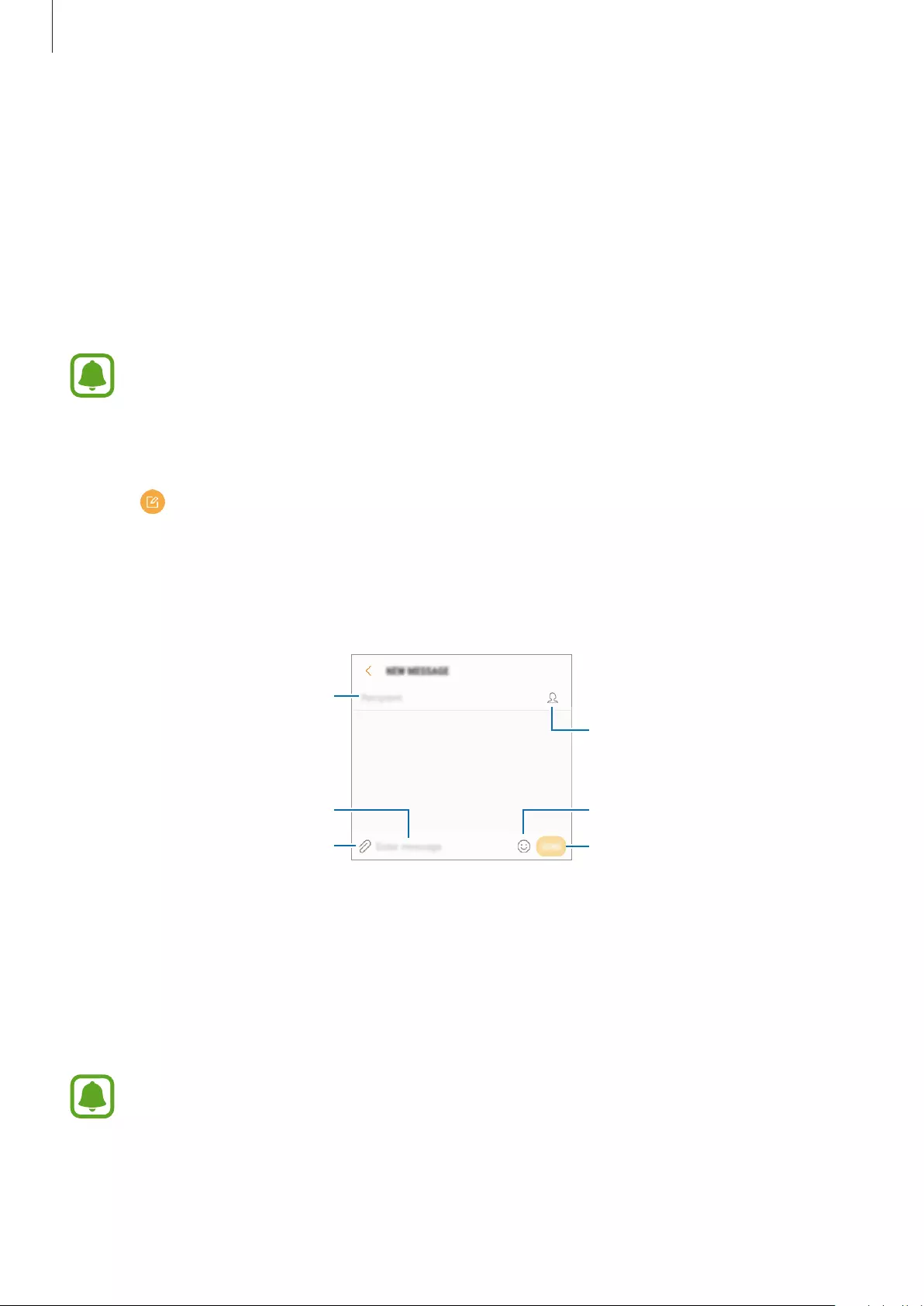
Applications
60
Messages
Introduction
Send and view messages by conversation.
Sending messages
You may incur additional charges for sending messages when you are roaming.
1 Tap
Messages
on the Apps screen.
2 Tap .
3 Add recipients and tap
COMPOSE
.
4 Enter a message.
Enter a message.
Add recipients from the contacts
list.
Enter emoticons.
Attach files.
Edit recipients.
Send the message.
5 Tap
SEND
to send the message.
Viewing messages
Messages are grouped into message threads by contact.
You may incur additional charges for receiving messages when you are roaming.
1 Tap
Messages
on the Apps screen.

Applications
61
2 On the messages list, select a contact.
3 View your conversation.
To reply to the message, enter a message and tap
SEND
.
Blocking unwanted messages
Block messages from specific numbers added to your block list.
1 Tap
Messages
on the Apps screen.
2 Tap
→
Settings
→
Block messages
→
Block numbers
.
3 Tap
INBOX
or
CONTACTS
, select a contact, and then tap .
To manually enter a number, tap
Enter number
, and then enter a phone number.
Setting the message notification
You can change notification sound, display options, and more.
1 Tap
Messages
on the Apps screen.
2 Tap
→
Settings
→
Notifications
, and then tap the switch to activate it.
3 Change the notification settings.
•
Notification sound
: Change the notification sound.
•
Vibrate when sound plays
: Set the device to vibrate when you receive messages.
•
Pop-up display
: Set the device to display messages in pop-up windows.
•
Preview message
: Set the device to display message content on the locked screen
and in pop-up windows.
Setting a message reminder
You can set an alert at an interval to let you know that you have unchecked notifications.
If this feature is not activated, open the Apps screen, tap
Settings
→
Accessibility
→
Notification reminder
, and then tap the switch to activate it. Then, tap the
Messages
switch
to activate it.

Applications
62
Internet
Introduction
Browse the Internet to search for information and bookmark your favourite webpages to
access them conveniently.
Browsing webpages
1 On the Apps screen, tap
Internet
.
2 Tap the address field.
3 Enter the web address or a keyword, and then tap
Go
.
To view the toolbars, drag your finger downwards slightly on the screen.
Bookmark the current webpage.
Open the homepage.
Move between pages. Open the browser's tab
manager.
Access additional options.
Refresh the current webpage.
View your bookmarks, saved
webpages, and recent browsing
history.

Applications
63
Using secret mode
In secret mode, you can separately manage open tabs, bookmarks, and saved pages. You can
lock secret mode using a password.
Activating secret mode
In the toolbar at the bottom of the screen, tap
Tabs
→
TURN ON SECRET MODE
. If you are
using this feature for the first time, set whether to use a password for secret mode.
In secret mode, you cannot use some features, such as screen capture.
In secret mode, the device will change the colour of the toolbars.
Changing security settings
You can change your password or the lock method.
Tap
→
Settings
→
Privacy
→
Secret mode security
→
Change password
.
Deactivating secret mode
In the toolbar at the bottom of the screen, tap
Tabs
→
TURN OFF SECRET MODE
.
Email
Setting up email accounts
Set up an email account when opening
Email
for the first time.
1 On the Apps screen, tap
Samsung
→
Email
.
2 Enter the email address and password, and then tap
SIGN IN
.
To manually register an email account, tap
MANUAL SETUP
.
3 Follow the on-screen instructions to complete the setup.
To set up another email account, tap
→
→
Add account
.
If you have more than one email account, you can set one as the default account. Tap
→
→
→
Set default account
.

Applications
64
Sending emails
1 Tap to compose an email.
2 Add recipients and enter an email text.
3 Tap
SEND
to send the mail.
Reading emails
When
Email
is open, the device will automatically retrieve new emails. To manually retrieve
emails, swipe downwards on the screen.
Tap an email on the screen to read it.
If email syncing is disabled, new emails cannot be retrieved. To enable email syncing,
tap
→
→
your account name, and then tap the
Sync account
switch to activate
it.
Camera
Introduction
Take photos and record videos using various modes and settings.
Camera etiquette
•
Do not take photos or record videos of other people without their permission.
•
Do not take photos or record videos where legally prohibited.
•
Do not take photos or record videos in places where you may violate other people’s
privacy.
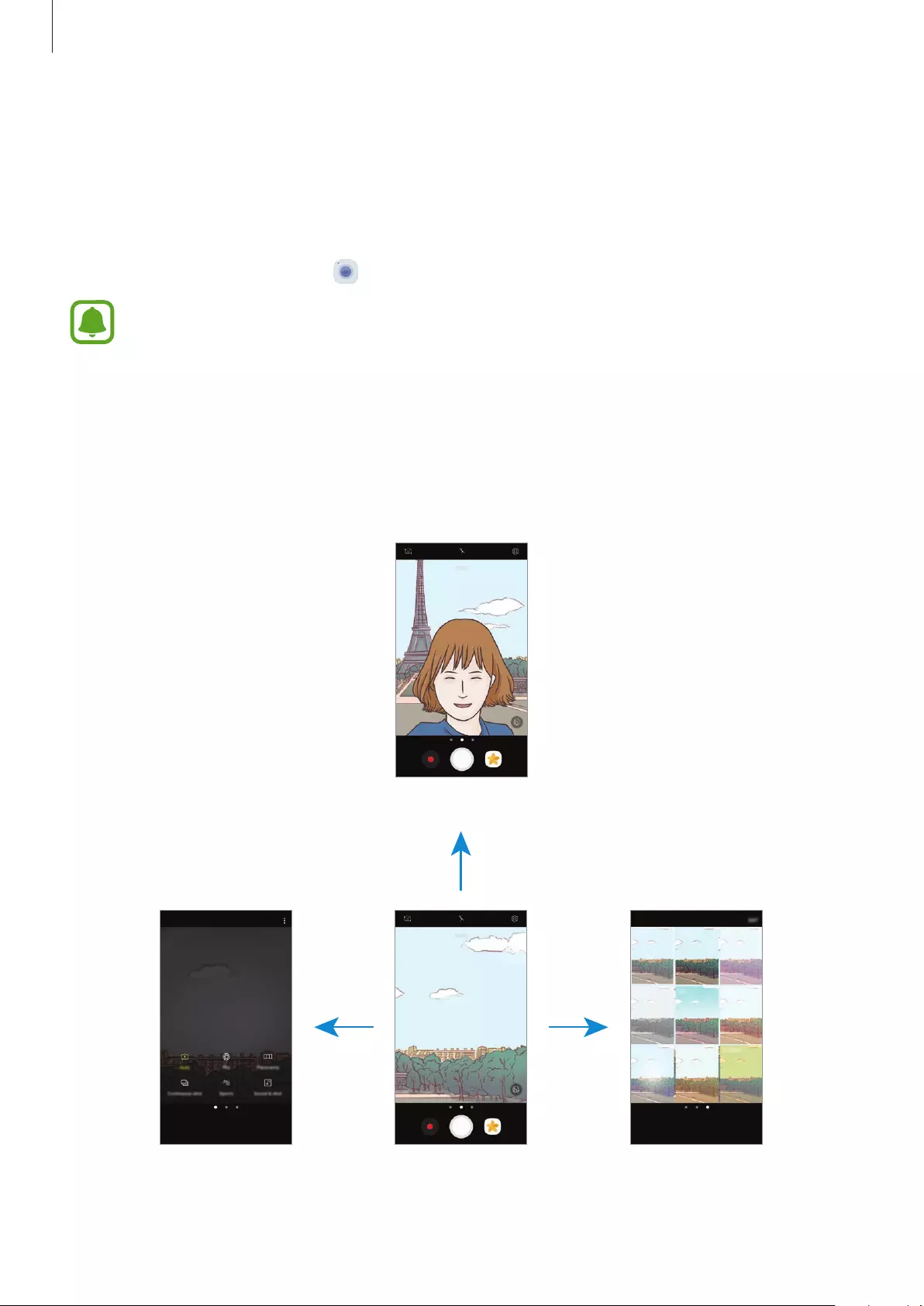
Applications
65
Launching Camera
Use the following methods to launch
Camera
:
•
Tap
Camera
on the Apps screen.
•
Press the Home key twice quickly.
•
On the locked screen, drag outside the large circle.
•
Some methods may not be available depending on the region or service provider.
•
Some camera features are not available when you launch
Camera
from the locked
screen or when the screen is turned off while the security features are activated.
Using swipe gestures
Quickly control the preview screen by swiping in different directions. You can change the
shooting mode, switch between cameras, or apply filter effects.
Front camera preview
Rear camera previewShooting modes Filter effects
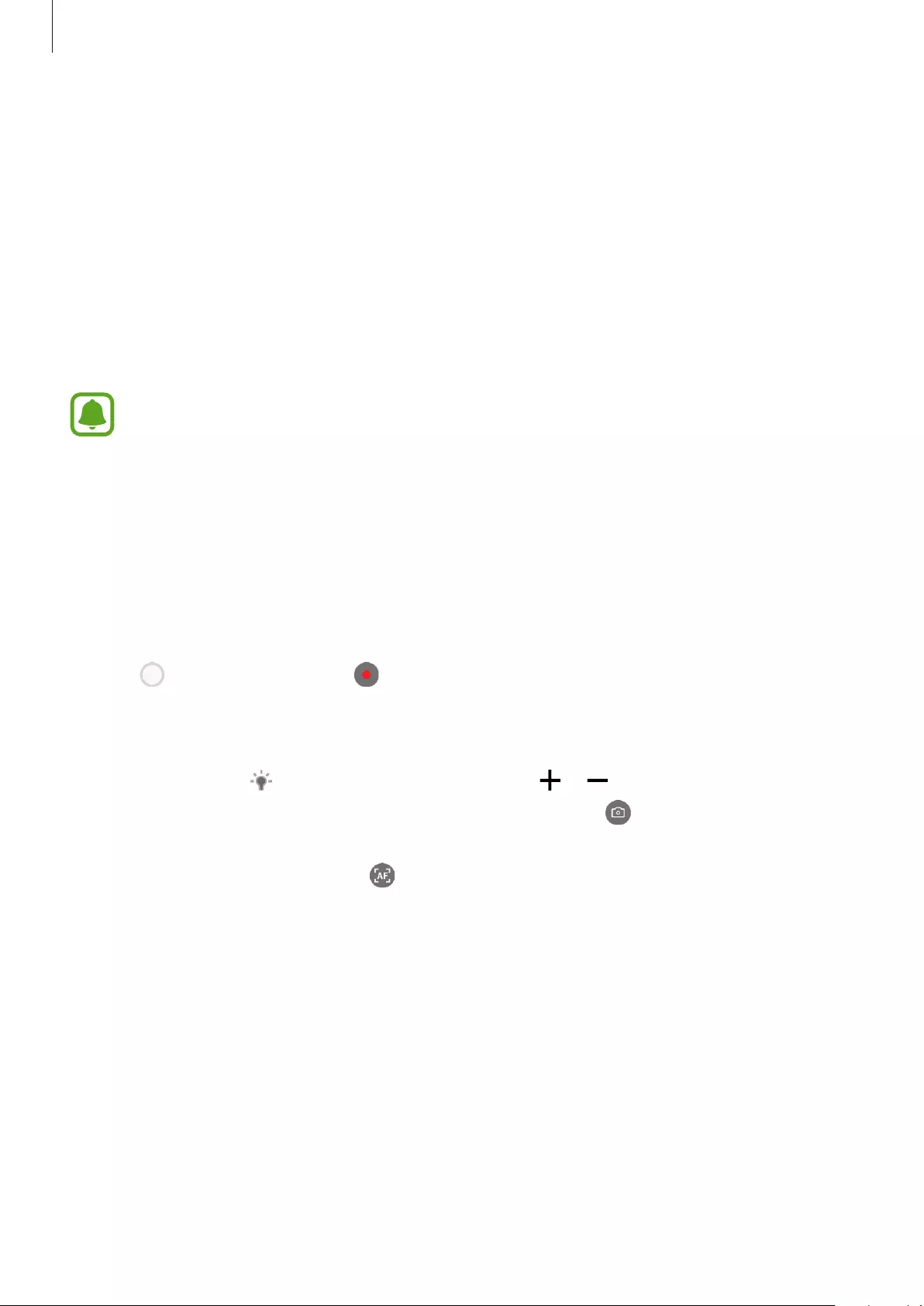
Applications
66
Switching cameras
On the preview screen, swipe upwards or downwards to switch between cameras.
Viewing shooting modes
On the preview screen, swipe from the left to the right to open the shooting modes list.
Viewing filter effects
On the preview screen, swipe from the right to the left to open the filter effects list. You can
apply a unique feel to your photos or videos.
This feature is only available in some shooting modes.
Basic shooting
Taking photos or recording videos
1 Tap the image on the preview screen where the camera should focus.
2 Tap to take a photo or tap to record a video.
•
Spread two fingers apart on the screen to zoom in, and pinch to zoom out.
•
To adjust the brightness of photos or videos, tap the screen. When the adjustment bar
appears, drag on the adjustment bar towards or .
•
To capture an image from the video while recording, tap .
•
To change the focus while recording a video, tap where you want to focus. To focus on
the centre of the screen, tap .

Applications
67
Camera settings
Switch between the
front and rear
cameras.
Change the flash
setting.
Record a video.
Take a photo.
Filter effects
Shooting modes
Preview thumbnail
Make faces appear
brighter and clearer.
Current mode
•
The preview screen may vary depending on the shooting mode and which camera
is being used.
•
The camera automatically shuts off when unused.
•
Make sure that the lens is clean. Otherwise, the device may not work properly in
some modes that require high resolutions.
•
The front camera features a wide-angle lens. Minor distortion may occur in wide-
angle photos and does not indicate device performance problems.
Locking the focus and exposure
You can lock the focus or exposure on a selected area to prevent the camera from
automatically adjusting based on changes to the subjects or light sources.
Tap and hold the area to focus. The AF/AE frame will appear on the area and the focus and
exposure setting will be locked. The setting remains locked even after you take a photo.
This feature is only available in some shooting modes.

Applications
68
Customizing shooting modes
On the preview screen, swipe to the right to open the shooting modes list and select a mode.
To view the description of each mode, tap
→
Info
.
To rearrange modes, tap
→
Edit
, tap and hold a mode icon, and then drag it to a new
location.
To add mode shortcuts to the Home screen, tap
→
Add shortcut on home screen
.
Auto mode
Auto mode allows the camera to evaluate the surroundings and determine the ideal mode
for the photo.
On the shooting modes list, tap
Auto
.
Pro mode
Take photos while manually adjusting various shooting options, such as exposure value and
ISO value.
On the shooting modes list, tap
Pro
. Select options and customize the settings, and then tap
to take a photo.
•
: Select an appropriate white balance, so images have a true-to-life colour range. You
can set the colour temperature. Tap and drag your finger on the colour temperature
bar.
•
: Select an ISO value. This controls camera light sensitivity. Low values are for
stationary or brightly lit objects. Higher values are for fast-moving or poorly lit objects.
However, higher ISO settings can result in noise in photos.
•
: Change the exposure value. This determines how much light the camera’s sensor
receives. If the image is too dark, use a higher exposure. If the image is too light, use a
lower exposure.

Applications
69
Panorama
Take a series of photos horizontally or vertically and then stitch them together to create a
wide scene.
To get the best shots using panorama mode, follow these tips:
•
Move the camera slowly in one direction.
•
Keep the image within the frame on the camera’s viewfinder. If the preview
image is out of the guide frame or you do not move the device, the device will
automatically stop taking photos.
•
Avoid taking photos of indistinct backgrounds, such as an empty sky or a plain
wall.
1 On the shooting modes list, tap
Panorama
.
2 Tap and move the device slowly in one direction.
3 Tap to stop taking photos.
4 On the preview screen, tap the preview thumbnail.
Continuous shot
Take a series of photos of moving subjects.
On the shooting modes list, tap
Continuous shot
.
Tap and hold to take several photos continuously.
Sports
Take a photo of fast-moving subjects.
On the shooting modes list, tap
Sports
.
Sound & shot
Take a photo with sound. The device identifies the photos with in
Gallery
.
On the shooting modes list, tap
Sound & shot
.

Applications
70
Selfie
Take self-portraits with the front camera. You can preview various beauty effects on the
screen.
1 On the preview screen, swipe upwards or downwards, or tap to switch to the front
camera for self-portraits.
2 On the shooting modes list, tap
Selfie
.
3 Face the front camera lens.
4 When the device detects your face, tap the screen to take a photo of yourself.
Alternatively, show your palm to the front camera. After recognizing your palm, a
countdown timer will appear. When the time is up, the device will take a photo.
To use various shooting options for the front camera, tap
→
Ways to take pictures
, and then tap the switches to activate them.
Using the selfie flash
When taking self-portraits with the front camera in low-light situations, the touchscreen can
serve as a flash.
On the preview screen, tap repeatedly until you reach .
When you take a photo, the touchscreen will flash.
Applying beauty effects
You can modify facial features, such as your skin tone or face shape, before taking self-
portraits.
This feature is available only in
Selfie
mode.
1 On the preview screen, tap .
2 Select the options below to apply beauty effects to your face on the preview screen and
take a photo of yourself.
•
Skin Tone
: Make your skin appear brighter and clearer.
•
Slim Face
: Adjust the face shape and make your face appear slimmer.
•
Large Eyes
: Make your eyes appear bigger.
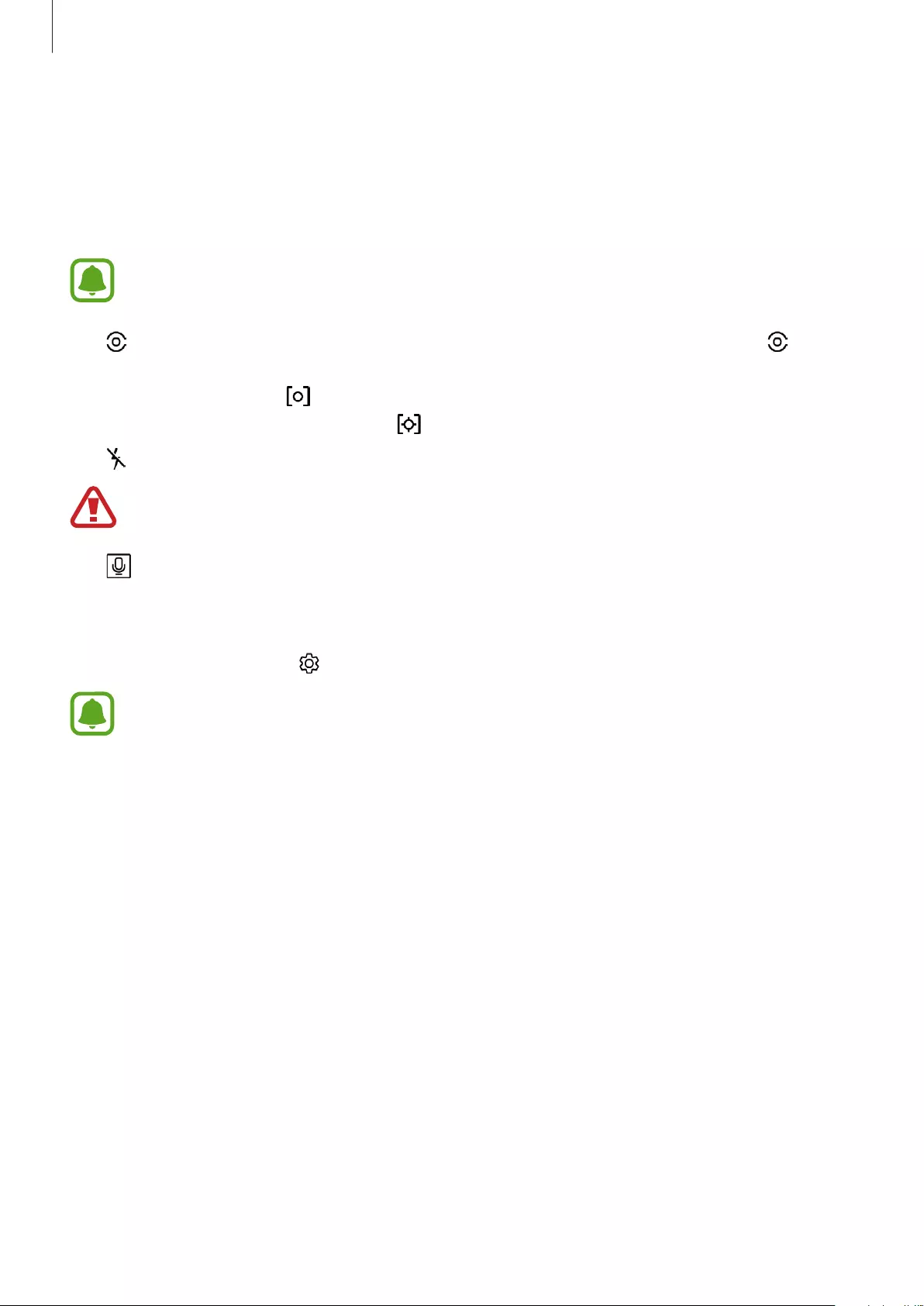
Applications
71
Camera settings
Quick settings
On the preview screen, use the following quick settings.
The available options may vary depending on the shooting mode and which camera
is being used.
•
: Select a metering method. This determines how light values are calculated.
Centre-weighted
uses the light in the centre portion of the shot to calculate the
exposure of the shot.
Spot
uses the light in a concentrated centre area of the shot to
calculate the exposure of the shot.
Matrix
averages the entire scene.
•
: Activate or deactivate the flash.
Do not use the flash close to your eyes. Using a flash close to the eyes may cause
temporary loss of vision or damage to the eyes.
•
: Set the device to record sound before or after taking a photo.
Camera settings
On the preview screen, tap .
The available options may vary depending on the shooting mode and which camera
is being used.
REAR CAMERA
•
Picture size
: Select a resolution for photos. Using a higher resolution will result in higher
quality photos, but they will take up more memory.
•
Video size
: Select a resolution for videos. Using a higher resolution will result in higher
quality videos, but they will take up more memory.

Applications
72
FRONT CAMERA
•
Picture size
: Select a resolution for photos. Using a higher resolution will result in higher
quality photos, but they will take up more memory.
•
Video size
: Select a resolution for videos. Using a higher resolution will result in higher
quality videos, but they will take up more memory.
•
Save pictures as previewed
: Invert the image to create a mirror-image of the original
scene, when taking photos with the front camera.
•
Ways to take pictures
: Select shooting options to use.
COMMON
•
Timer
: Select the length of the delay before the camera automatically takes a photo.
•
Grid lines
: Display viewfinder guides to help composition when selecting subjects.
•
Location tags
: Attach a GPS location tag to the photo.
•
GPS signal strength may decrease in locations where the signal is obstructed, such
as between buildings or in low-lying areas, or in poor weather conditions.
•
Your location may appear on your photos when you upload them to the Internet.
To avoid this, deactivate the location tag setting.
•
Review pictures
: Set the device to show photos after capturing them.
•
Quick launch
: Set the device to launch the camera by pressing the Home key twice
quickly.
•
Storage location
: Select the memory location for storage.
•
Volume key function
: Set the device to use the Volume key to control the shutter.
•
Shutter sound: Turn the shutter sound on or off.
•
Reset settings
: Reset the camera settings.
•
Contact us
: Ask questions or view frequently asked questions. Refer to Samsung
Members for more information.

Applications
73
Gallery
Introduction
View images and videos stored in your device. You can also manage images and videos by
album or create stories to share with others.
Viewing images and videos
Viewing images
1 On the Apps screen, tap
Gallery
→
PICTURES
.

Applications
74
2 Select an image.
Access additional options.
Share the image with others. Delete the image.
Modify the image.
Add the image to favourites.
To hide or show the menus, tap the screen.
You can create a GIF animation or collage from multiple images. Tap
→
Animate
or
Collage
, and then select images. You can select up to six images for your collage.

Applications
75
Viewing videos
1 On the Apps screen, tap
Gallery
→
PICTURES
.
2 Select a video to play. Video files show the icon on the preview thumbnail.
Lock the playback
screen.
Switch to the
pop-up video player.
Rewind or
fast-forward by
dragging the bar.
Skip to the previous
video. Tap and hold
to rewind.
Skip to the next
video. Tap and hold
to fast-forward.
Access additional
options.
Change screen ratio.
Pause and resume
playback.
Create a GIF
animation.
Drag your finger up or down on the left side of the playback screen to adjust the brightness,
or drag your finger up or down on the right side of the playback screen to adjust the volume.
Viewing albums
You can sort the images and videos saved in your device by folder or album. The animations
or collages you have created will also be sorted in your folders on the albums list.
On the Apps screen, tap
Gallery
→
ALBUMS
and select an album.
Viewing stories
When you capture or save images and videos, the device will read their date and location
tags, sort the images and videos, and then create stories. To create stories automatically, you
must capture or save multiple images and videos.

Applications
76
Creating stories
Create stories with various themes.
1 On the Apps screen, tap
Gallery
→
STORIES
.
2 Tap
→
Create story
.
3 Tick images or videos to include in the story and tap
DONE
.
4 Enter a title for the story and tap
CREATE
.
To add images or videos to a story, select a story and tap
ADD
.
To remove images or videos from a story, select a story, tap
→
Edit
, tick images or videos to
remove, and then tap
→
Remove from story
.
Sharing stories
You can share stories with your contacts.
1 On the Apps screen, tap
Gallery
→
STORIES
.
2 Select a story to share.
3 Tap
INVITE
, tick contacts, and then tap
DONE
.
When your contacts accept the share request, the story will be shared and more images
and videos can be added to the story by your contacts.
•
To use this feature, your phone number must be verified.
•
You may incur additional charges when sharing files via the mobile network.
•
If the recipients have not verified their phone numbers or if their devices do not
support the feature, a link to the files will be sent to them via text message. Link
recipients may not be able to use some features. The link will expire after a certain
period.
Deleting stories
1 On the Apps screen, tap
Gallery
→
STORIES
.
2 Tap and hold a story to delete, and tap
DELETE
.

Applications
77
Syncing images and videos with Samsung Cloud
You can sync images and videos saved in
Gallery
with Samsung Cloud and access them from
other devices. You must register and sign in to your Samsung account to use Samsung Cloud.
Refer to Samsung account for more information.
On the Apps screen, tap
Gallery
→
→
Settings
and tap the
Samsung Cloud
switch to
activate it. Images and videos captured on the device will be automatically saved to Samsung
Cloud.
Deleting images or videos
Deleting an image or a video
Select an image or a video and tap
Delete
at the bottom of the screen.
Deleting multiple images and videos
1 On the Gallery screen, tap and hold an image or a video to delete.
2 Tick the images or videos to delete.
3 Tap
DELETE
.
Sharing images or videos
Select an image or a video, tap
Share
at the bottom of the screen, and then select a sharing
method.

Applications
78
Samsung Members
Samsung Members
offers support services to customers, such as device problem diagnosis,
and lets users submit questions and error reports. You can also share information with others
in the Galaxy users’ community or view the latest Galaxy news and tips.
Samsung Members
can help you solve any problems you might encounter while using your device.
Additional options
Send feedback
•
This app’s availability and supported features may vary depending on the region or
service provider.
•
This app may appear in the
Samsung
folder depending on the region or service
provider.
•
To submit your feedback or post your comments, you must sign in to your
Samsung account. Refer to Samsung account for more information.
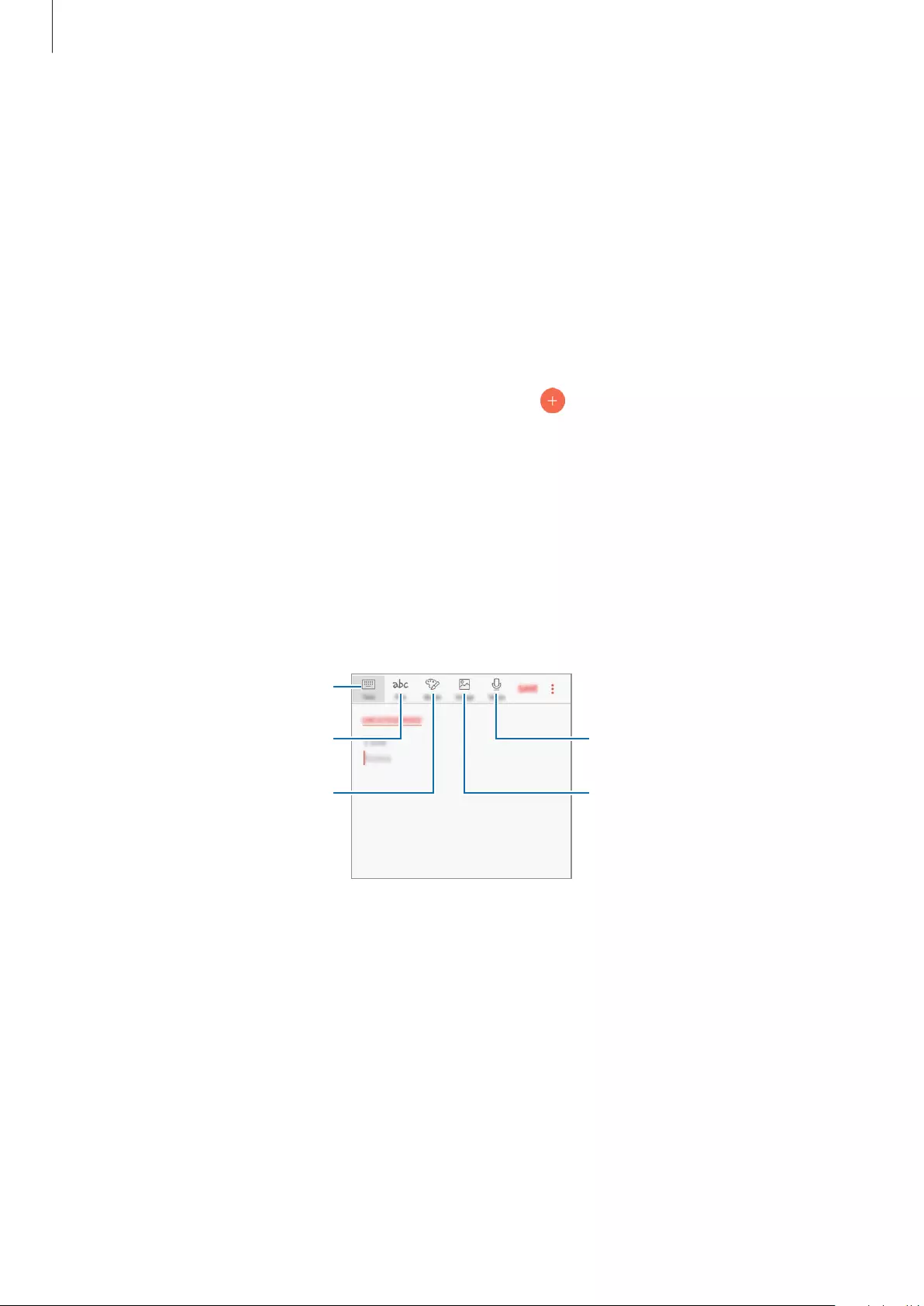
Applications
79
Samsung Notes
Introduction
Create notes by entering text from the keyboard or by writing or drawing on the screen. You
can also insert images or voice recordings into your notes.
Creating notes
1 On the Apps screen, tap
Samsung Notes
→
ALL
→
.
2 Select an input method from the toolbar at the top of the screen and compose a note.
Tap
Pen
to write or draw.
Tap
Brush
to paint with various brushes.
Tap
Image
to insert an image by selecting from
Gallery
or by taking a photo.
Tap
Voice
to make a voice recording and insert it into the note. Voice recording will start
immediately.
Enter text using the keyboard.
Write or draw with pens.
Paint with brushes.
Insert a voice recording.
Insert an image.
3 When you are finished composing the note, tap
SAVE
.

Applications
80
Deleting notes
1 On the Apps screen, tap
Samsung Notes
.
2 Tap
ALL
, or tap
COLLECTIONS
and select a category.
3 Tap and hold a note to delete.
To delete multiple notes, tick more notes to delete.
4 Tap
DELETE
.
Calendar
Introduction
Manage your schedule by entering upcoming events or tasks in your planner.
Creating events
1 Tap
Calendar
on the Apps screen.
2 Tap or double-tap a date.
If the date already has saved events or tasks in it, tap the date and tap .
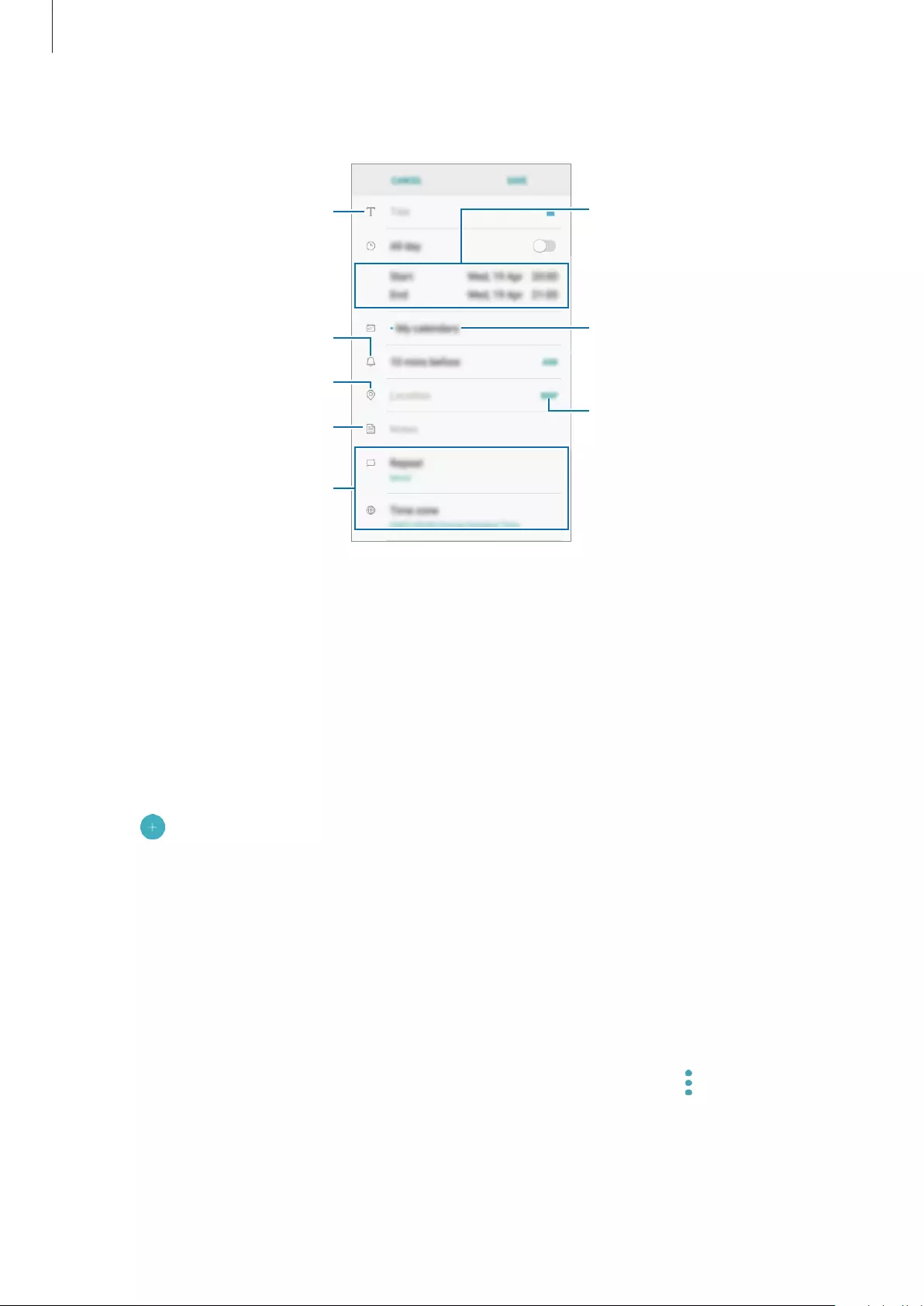
Applications
81
3 Enter event details.
Select a calendar to use or sync
with.
Attach a map showing the
location of the event.
Enter the location of the event.
Add a note.
Enter a title. Set a start and end date for the
event.
Add more details.
Set an alarm.
4 Tap
SAVE
to save the event.
Creating tasks
1 Tap
Calendar
on the Apps screen.
2 Tap
VIEW
→
Tasks
.
3 Tap and enter task details.
4 Tap
SAVE
to save the task.
Syncing events and tasks with your accounts
On the Apps screen, tap
Settings
→
Cloud and accounts
→
Accounts
, select an account
name, select the account to sync with, and then tap
Calendar (Samsung account)
or
Sync Calendar
.
To add accounts to sync with, open the Apps screen and tap
Calendar
→
→
Manage calendars
→
Add account
. Then, select an account to sync with and sign in. When
an account is added, it will appear on the list.
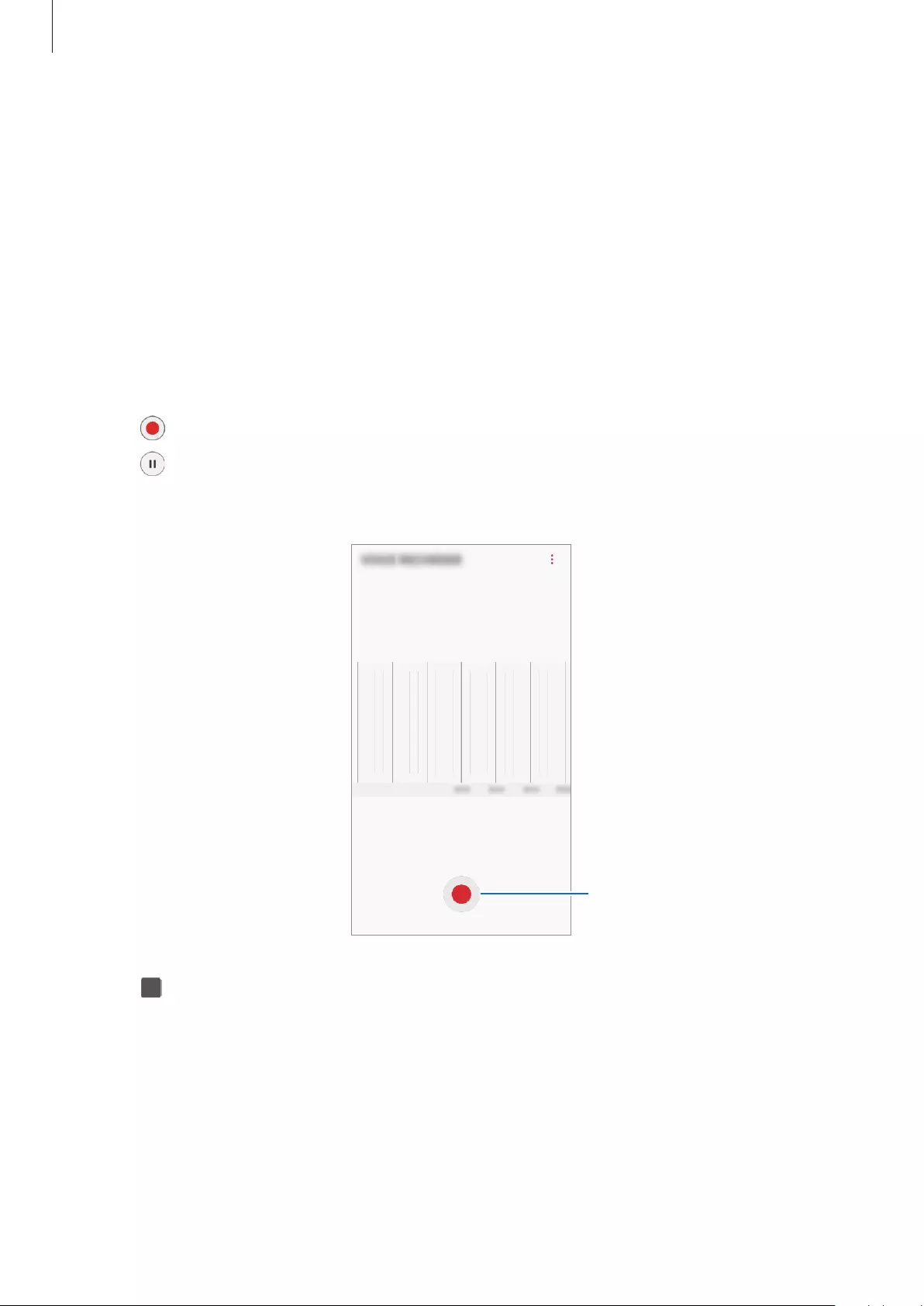
Applications
82
Voice Recorder
Introduction
Record and play back voice recordings.
Making voice recordings
1 On the Apps screen, tap
Samsung
→
Voice Recorder
.
2 Tap to start recording. Speak into the microphone.
Tap to pause recording.
While making a voice recording, tap
Bookmark
to insert a bookmark.
Start recording.
3 Tap to finish recording.
4 Enter a file name and tap
SAVE
.

Applications
83
My Files
Access and manage various files stored in the device.
On the Apps screen, tap
Samsung
→
My Files
.
View files that are stored in each storage. You can also view files in your device or a memory
card by category.
To free up the device’s storage, tap
→
Manage storage usage
→
CLEAN NOW
.
To search for files or folders, tap .
Clock
Introduction
Set alarms, check the current time in many cities around the world, time an event, or set a
specific duration.
ALARM
On the Apps screen, tap
Clock
→
ALARM
.
Setting alarms
Tap in the alarms list, set an alarm time, select the days on which the alarm will repeat, set
other various alarm options, and then tap
SAVE
.
To open the keypad to enter an alarm time, tap the time input field.
To activate or deactivate alarms, tap the switch next to the alarm in the alarms list.
Stopping alarms
Tap
DISMISS
to stop an alarm. If you have previously enabled the snooze option, tap
SNOOZE
to repeat the alarm after a specified length of time.
Deleting alarms
Tap and hold an alarm, tick alarms to delete, and then tap
DELETE
.

Applications
84
WORLD CLOCK
On the Apps screen, tap
Clock
→
WORLD CLOCK
.
Creating clocks
Tap , enter a city name or select a city from the cities list.
Deleting clocks
Tap and hold a clock, tick clocks to delete, and then tap
DELETE
.
STOPWATCH
1 On the Apps screen, tap
Clock
→
STOPWATCH
.
2 Tap
START
to time an event.
To record lap times while timing an event, tap
LAP
.
3 Tap
STOP
to stop timing.
To restart the timing, tap
RESUME
.
To clear lap times, tap
RESET
.
TIMER
1 On the Apps screen, tap
Clock
→
TIMER
.
2 Set the duration, and then tap
START
.
To open the keypad to enter the duration, tap the duration input field.
3 Tap
DISMISS
when the timer goes off.

Applications
85
Calculator
Perform simple or complex calculations.
Tap
Calculator
on the Apps screen.
Rotate the device to landscape orientation to display the scientific calculator. If
Auto rotate
is
disabled, tap to display the scientific calculator.
To see the calculation history, tap
HISTORY
. To close the calculation history panel, tap
KEYPAD
.
To clear the history, tap
HISTORY
→
CLEAR HISTORY
.
To use the unit conversion tool, tap . You can convert various values, such as area, length, or
temperature, into other units.
Google apps
Google provides entertainment, social network, and business apps. You may require a Google
account to access some apps. Refer to Accounts for more information.
To view more app information, access each app’s help menu.
Some apps may not be available or may be labelled differently depending on the
region or service provider.
Chrome
Search for information and browse webpages.
Gmail
Send or receive emails via the Google Mail service.
Maps
Find your location on the map, search the world map, and view location information for
various places around you.
Play Music
Discover, listen to, and share music on your device. You can upload music collections stored
on your device to the cloud and access them later.

Applications
86
Play Movies & TV
Purchase or rent videos, such as movies and TV programmes, from
Play Store
.
Drive
Store your content on the cloud, access it from anywhere, and share it with others.
YouTube
Watch or create videos and share them with others.
Photos
Search for, manage, and edit all your photos and videos from various sources in one place.
Duo
Have video calls with others.
Google
Search quickly for items on the Internet or your device.

87
Settings
Introduction
Customize settings for functions and apps. You can make your device more personalized by
configuring various setting options.
On the Apps screen, tap
Settings
.
To search for settings by entering keywords, tap .
Connections
Wi-Fi
Activate the Wi-Fi feature to connect to a Wi-Fi network and access the Internet or other
network devices.
Turn off Wi-Fi to save the battery when not in use.
Connecting to a Wi-Fi network
1 On the Settings screen, tap
Connections
→
Wi-Fi
, and then tap the switch to activate it.
2 Select a network from the Wi-Fi networks list.
Networks that require a password appear with a lock icon.
3 Tap
CONNECT
.
•
Once the device connects to a Wi-Fi network, the device will reconnect to that
network each time it is available without requiring a password. To prevent the
device connecting to the network automatically, select it from the list of networks
and tap
FORGET
.
•
If you cannot connect to a Wi-Fi network properly, restart your device’s Wi-Fi feature
or the wireless router.

Settings
88
Wi-Fi Direct
Wi-Fi Direct connects devices directly via a Wi-Fi network without requiring an access point.
1 On the Settings screen, tap
Connections
→
Wi-Fi
, and then tap the switch to activate it.
2 Tap
Wi-Fi Direct
.
The detected devices are listed.
If the device you want to connect to is not in the list, request that the device turns on its
Wi-Fi Direct feature.
3 Select a device to connect to.
The devices will be connected when the other device accepts the Wi-Fi Direct connection
request.
Sending and receiving data
You can share data, such as contacts or media files, with other devices. The following actions
are an example of sending an image to another device.
1 Tap
Gallery
on the Apps screen.
2 Select an image.
3 Tap
Share
→
Wi-Fi Direct
and select a device to transfer the image to.
4 Accept the Wi-Fi Direct connection request on the other device.
If the devices are already connected, the image will be sent to the other device without
the connection request procedure.

Settings
89
Ending the device connection
1 On the Settings screen, tap
Connections
→
Wi-Fi
.
2 Tap
Wi-Fi Direct
.
The device displays the connected devices in the list.
3 Tap the device name to disconnect the devices.
Bluetooth
Use Bluetooth to exchange data or media files with other Bluetooth-enabled devices.
•
Samsung is not responsible for the loss, interception, or misuse of data sent or
received via Bluetooth.
•
Always ensure that you share and receive data with devices that are trusted
and properly secured. If there are obstacles between the devices, the operating
distance may be reduced.
•
Some devices, especially those that are not tested or approved by the Bluetooth
SIG, may be incompatible with your device.
•
Do not use the Bluetooth feature for illegal purposes (for example, pirating copies
of files or illegally tapping communications for commercial purposes).
Samsung is not responsible for the repercussion of illegal use of the Bluetooth
feature.
Pairing with other Bluetooth devices
1 On the Settings screen, tap
Connections
→
Bluetooth
, and then tap the switch to
activate it.
The detected devices are listed.
2 Select a device to pair with.
If the device you want to pair with is not in the list, turn on its visibility option. Refer to the
other device’s user manual.
Your device is visible to other devices while the Bluetooth settings screen is open.

Settings
90
3 Accept the Bluetooth connection request on your device to confirm.
The devices will be connected when the other device accepts the Bluetooth connection
request.
Sending and receiving data
Many apps support data transfer via Bluetooth. You can share data, such as contacts or media
files, with other Bluetooth devices. The following actions are an example of sending an image
to another device.
1 Tap
Gallery
on the Apps screen.
2 Select an image.
3 Tap
Share
→
Bluetooth
, and then select a device to transfer the image to.
If your device has paired with the device before, tap the device name without confirming
the auto-generated passkey.
If the device you want to pair with is not in the list, turn on its visibility option.
4 Accept the Bluetooth connection request on the other device.
Unpairing Bluetooth devices
1 On the Settings screen, tap
Connections
→
Bluetooth
.
The device displays the paired devices in the list.
2 Tap next to the device name to unpair.
3 Tap
Unpair
.

Settings
91
Data usage
Keep track of your data usage amount and customize the settings for the limitation.
On the Settings screen, tap
Connections
→
Data usage
.
•
Data saver
: Prevent apps that are running in the background from using a mobile data
connection.
•
Mobile data
: Set the device to use data connections on any mobile network.
•
Mobile data usage
: Monitor your mobile data usage.
•
Billing cycle and Data Warning
: Set a limit for mobile data usage.
•
Wi-Fi data usage
: Monitor your Wi-Fi data usage.
•
Restrict networks
: Select Wi-Fi networks to prevent apps running in the background
from using them.
To change the monthly reset date for the monitoring period, tap
Billing cycle
→
Start billing
cycle on
.
Limiting data usage
Set the device to automatically disable the mobile data connection when the amount of
mobile data you have used reaches your specified limit.
1 On the Settings screen, tap
Connections
→
Data usage
→
Billing cycle
, and then tap
the
Data limit
switch to activate it.
2 Tap
Data limit
, enter the limit, and then tap
SET
.
3 Tap
Data warning
, enter a data usage alert level, and then tap
SET
.
The device will alert you when the warning level is reached.
Flight mode
This disables all wireless functions on your device. You can use only non-network services.
On the Settings screen, tap
Connections
and tap the
Flight mode
switch to activate it.
Make sure the device is turned off during takeoff and landing. After takeoff, you can
use the device in flight mode if allowed by aircraft personnel.

Settings
92
Mobile hotspot and tethering
Use the device as a mobile hotspot to share the device’s mobile data connection with other
devices when the network connection is not available. Connections can be made via Wi-Fi,
USB, or Bluetooth.
On the Settings screen, tap
Connections
→
Mobile hotspot and tethering
.
You may incur additional charges when using this feature.
•
Mobile hotspot
: Use the mobile hotspot to share the device’s mobile data connection
with computers or other devices.
•
USB tethering
: Use USB tethering to share the device’s mobile data connection with
a computer via USB. When connected to a computer, the device is used as a wireless
modem for the computer.
Using the mobile hotspot
Use your device as a mobile hotspot to share your device’s mobile data connection with other
devices.
1 On the Settings screen, tap
Connections
→
Mobile hotspot and tethering
→
Mobile hotspot
.
2 Tap the switch to activate it.
The icon appears on the status bar. Other devices can find your device in the Wi-Fi
networks list.
To set a password for the mobile hotspot, tap
→
Configure Mobile hotspot
and select
the level of security. Then, enter a password and tap
SAVE
.
3 On the other device’s screen, search for and select your device from the Wi-Fi networks
list.
4 On the connected device, use the device’s mobile data connection to access the Internet.

Settings
93
Mobile networks
Configure your mobile network settings.
On the Settings screen, tap
Connections
→
Mobile networks
.
•
Data roaming
: Set the device to use data connections when you are roaming.
•
Network mode
: Select a network type.
•
Access Point Names
: Set up access point names (APNs).
•
Network operators
: Search for available networks and manually register a network.
Location
Change settings for location information permissions.
On the Settings screen, tap
Connections
→
Location
.
•
Locating method
: Select a method to use for locating your device.
•
Improve accuracy
: Set the device to use the Wi-Fi or Bluetooth feature to increase the
accuracy of your location information, even when the features are deactivated.
•
RECENT LOCATION REQUESTS
: View which apps request your current location
information and their battery usage.
•
LOCATION SERVICES
: View the location services your device is using.
More connection settings
Customize settings to control other features.
On the Settings screen, tap
Connections
→
More connection settings
.
•
Nearby device scanning
: Set the device to scan for nearby devices to connect to.
•
Printing
: Configure settings for printer plug-ins installed on the device. You can search
for available printers or add one manually to print files. Refer to Printing for more
information.
•
VPN
: Set up and connect to virtual private networks (VPNs).

Settings
94
Printing
Configure settings for printer plug-ins installed on the device. You can connect the device to a
printer via Wi-Fi or Wi-Fi Direct, and print images or documents.
Some printers may not be compatible with the device.
Adding printer plug-ins
Add printer plug-ins for printers you want to connect the device to.
1 On the Settings screen, tap
Connections
→
More connection settings
→
Printing
→
DOWNLOAD PLUG-IN
.
2 Search for a printer plug-in in
Play Store
.
3 Select a printer plug-in and install it.
4 Select the printer plug-in and tap the switch to activate it.
The device searches for printers that are connected to the same Wi-Fi network as your
device.
5 Select a printer to add.
To add printers manually, tap
→
Add printer
.
Printing content
While viewing content, such as images or documents, access the options list, tap
Print
→
→
All printers...
, and then select a printer.
Printing methods may vary depending on the content type.

Settings
95
Sounds and vibration
Change settings for various sounds on the device.
On the Settings screen, tap
Sounds and vibration
.
•
Sound mode
: Set the device to use sound mode or silent mode.
•
Vibrate while ringing
: Set the device to vibrate and play a ringtone for incoming calls.
•
Default Volume key control
: Set the default Volume key control.
•
Volume
: Adjust the volume level for call ringtones, music and videos, system sounds, and
notifications.
•
Ringtone
: Change the call ringtone.
•
Vibration pattern
: Select a vibration pattern.
•
Notification sounds
: Change the notification sound settings for each app.
•
Do not disturb
: Set the device to mute incoming calls, notification sounds, and media,
except for allowed exceptions.
•
Touch sounds
: Set the device to sound when you select an app or option on the
touchscreen.
•
Screen lock sounds
: Set the device to sound when you lock or unlock the touchscreen.
•
Charging sound
: Set the device to sound when it is connected to a charger.
•
Dialing keypad tones
: Set the device to sound when you tap the buttons on the keypad.
•
Keyboard sound
: Set the device to sound when a key is touched.
•
Sound quality and effects
: Configure additional sound settings.
Notifications
Change the notification settings for each app.
On the Settings screen, tap
Notifications
.
To customize notification settings, tap
ADVANCED
and select an app.
•
Allow notifications
: Allow notifications from the selected app.
•
Show silently
: Set the device to mute notification sounds and hide notification previews.
•
On lock screen: Show or hide notifications from the selected app when the device is
locked (only appears when a screen lock is set).
•
Set as priority
: Display notifications at the top of the notification panel and include them
in the allowed list when
Do not disturb
is activated.

Settings
96
Display
Options
Change the display and the Home screen settings.
On the Settings screen, tap
Display
.
•
Brightness
: Adjust the brightness of the display.
•
Outdoor mode
: Activate outdoor mode to make the display easier to see in bright
conditions.
•
Screen zoom and font
: Change the screen zoom setting or font size and style.
•
Home screen
: Customize the Home screen by adding, deleting, or rearranging Home
screen panels, and more.
•
Easy mode
: Switch to easy mode to display larger icons and apply a simpler layout to the
Home screen.
•
Icon frames
: Set whether to display shaded backgrounds to make icons stand out.
•
Status bar
: Customize the settings for displaying notifications or indicators on the status
bar.
•
Screen timeout
: Set the length of time the device waits before turning off the display’s
backlight.
•
Screensaver
: Set the device to launch a screensaver when the device is charging or
connected to a dock.
Wallpapers and themes
Change the wallpaper settings for the Home screen and the locked screen or apply various
themes to the device.
On the Settings screen, tap
Wallpapers and themes
.
•
WALLPAPERS
: Change the wallpaper settings for the Home screen and the locked screen.
•
THEMES
: Change the device’s theme.
•
ICONS
: Change the icon style.

Settings
97
Advanced features
Options
Activate advanced features and change the settings that control them.
On the Settings screen, tap
Advanced features
.
Excessive shaking or impact to the device may cause unintended input for some
features.
•
Identify unsaved numbers
: Set the device to identify unsaved phone numbers when
you receive incoming calls or messages.
This feature may not be available depending on the region or service provider.
•
One-handed mode
: Activate one-handed operation mode for your convenience when
using the device with one hand.
•
Quick launch Camera
: Set the device to launch the camera by pressing the Home key
twice quickly.
•
Multi window
: Select a Multi window launch method.
•
Direct call: Call the contact whose message or contact details are shown on the screen
when you move the phone close to your ear.
•
Smart alert
: Set the device to alert you if you have missed calls or new messages when
you pick up the device.
This feature may not work if the screen is turned on or the device is not on a flat
surface.

Settings
98
•
Easy mute
: Set the device to mute incoming calls or alarms by facing the device’s screen
downwards.
•
Send SOS messages
: Set the device to send help messages by pressing the Power
key three times. You can also send sound recordings along with the message to the
recipients. Refer to Send SOS messages for more information.
•
Direct share
: Set the device to display the people you contacted on the sharing options
panel to allow you to share content directly.
Send SOS messages
In an emergency situation, quickly press the Power key three times. The device sends
messages to your emergency contacts. The messages include your location information.
1 On the Settings screen, tap
Advanced features
→
Send SOS messages
, and then tap the
switch to activate it.
2 Follow the on-screen instructions to add emergency contacts if you have not already
done so.
To send help messages with audio recordings or photos, tap the
Attach audio recording
or
Attach pictures
switch to activate it.
The
Attach pictures
option may not be available depending on the region or service
provider.
Adding emergency contacts
On the Settings screen, tap
Advanced features
→
Send SOS messages
→
Send messages to
→
ADD
. Tap
Create contact
and enter contact information or tap
Select
from Contacts
to add an existing contact as an emergency contact.
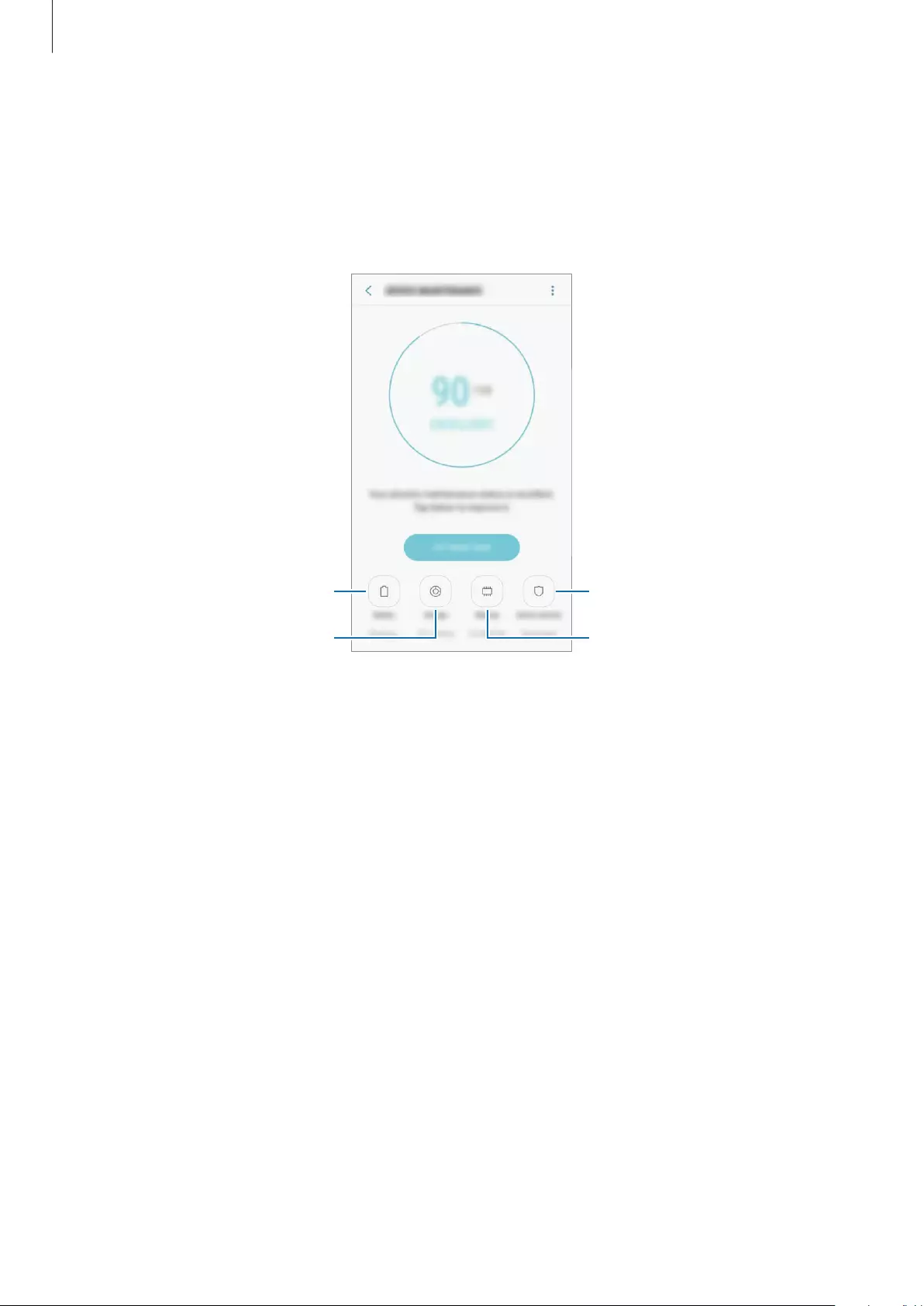
Settings
99
Device maintenance
The device maintenance feature provides an overview of the status of your device’s battery,
storage, memory, and system security. You can also automatically optimize the device with a
tap of your finger.
Battery
Storage
Device security
Memory
Using the quick optimization feature
On the Settings screen, tap
Device maintenance
→
FIX NOW
or
OPTIMIZE NOW
.
The quick optimization feature improves device performance through the following actions.
•
Clearing some memory.
•
Deleting unnecessary files and closing apps running in the background.
•
Managing abnormal battery usage.
•
Scanning for malware.

Settings
100
Battery
Check the remaining battery power and time to use the device. For devices with low battery
levels, conserve battery power by activating power saving features.
On the Settings screen, tap
Device maintenance
→
Battery
.
•
The usage time left shows the time remaining before the battery power runs
out. Usage time left may vary depending on your device settings and operating
conditions.
•
You cannot receive notifications from apps that use power saving mode.
Power saving mode
•
MID
: Activate power saving mode to extend the battery’s usage time.
•
MAX
: In maximum power saving mode, the device decreases battery consumption
by applying the dark theme and limiting the apps and features available. Network
connections, except for the mobile network, will be deactivated.
Managing the battery
You can save battery power by preventing apps that are running in the background from
using battery power when they are not being used. Tick apps from the apps list and tap
SAVE POWER
. Also, tap
→
Advanced settings
to set app power monitor options.
Storage
Check the status of the used and available memory.
On the Settings screen, tap
Device maintenance
→
Storage
.
The actual available capacity of the internal memory is less than the specified
capacity because the operating system and default apps occupy part of the memory.
The available capacity may change when you update the device.
Managing the memory
To delete residual files, such as cache, tap
CLEAN NOW
. To delete files or uninstall apps that
you do not use any more, select a category under
USER DATA
. Then, tick items to select and
tap
DELETE
or
UNINSTALL
.

Settings
101
Memory
On the Settings screen, tap
Device maintenance
→
Memory
.
To speed up your device by reducing the amount of memory you are using, tick apps from
the apps list, and tap
CLEAN NOW
.
Device security
Check the device’s security status. This feature scans your device for malware.
On the Settings screen, tap
Device maintenance
→
Device security
→
SCAN PHONE
.
Apps
Manage the device’s apps and change their settings. You can view the apps’ usage
information, change their notification or permission settings, or uninstall or disable
unnecessary apps.
On the Settings screen, tap
Apps
.
Lock screen and security
Options
Change the settings for securing the device and the SIM or USIM card.
On the Settings screen, tap
Lock screen and security
.
The available options may vary depending on the screen lock method selected.
•
Screen lock type
: Change the screen lock method.
•
Info and app shortcuts
: Change settings for the items displayed on the locked screen.
•
Notifications
: Set whether or not to show notification content on the locked screen and
select which notifications to display.
•
Find My Mobile
: Activate or deactivate the Find My Mobile feature. Access the Find My
Mobile website (findmymobile.samsung.com) to track and control your lost or stolen
device.

Settings
102
•
Unknown sources
: Set the device to allow the installation of apps from unknown
sources.
•
Secure Folder
: Create a secure folder to protect your private content and apps from
others. Refer to Secure Folder for more information.
•
Secure startup
: Protect your device by setting it to require a screen unlock code when
turning on the device. You must enter the unlock code to start the device and receive
messages and notifications.
•
Encrypt SD card
: Set the device to encrypt files on a memory card.
If you reset your device to the factory defaults with this setting enabled, the device
will not be able to read your encrypted files. Disable this setting before resetting the
device.
•
Other security settings
: Configure additional security settings.
Cloud and accounts
Introduction
Sync, back up, or restore your device’s data using Samsung Cloud. You can also register and
manage accounts, such as your Samsung account or Google account.
On the Settings screen, tap
Cloud and accounts
.
Regularly back up your data to a safe location, such as Samsung Cloud or a computer,
so that you can restore it if the data is corrupted or lost due to an unintended factory
data reset.
•
Samsung Cloud
: Manage the content that you want to store securely in Samsung Cloud.
Check the usage status of your Samsung Cloud storage, and sync, back up, and restore
your data. Refer to Samsung Cloud for more information.
•
Accounts
: Add your Samsung and Google accounts, or other accounts, to sync with. Refer
to Accounts for more information.
•
Backup and restore
: Keep your personal information, app data, and settings safe on your
device. You can back up your sensitive information and access it later. You must sign in to
your Google or Samsung account to back up or restore data. Refer to Backup and restore
for more information.

Settings
103
Samsung Cloud
You can manage the content that you want to store securely in Samsung Cloud. Check the
usage status of your Samsung Cloud storage, and sync, back up, and restore your data.
On the Settings screen, tap
Cloud and accounts
→
Samsung Cloud
.
Manage cloud storage
View the amount of storage space you are currently using in Samsung Cloud and the amount
of usage by data type. You can also delete backup data from old devices after restoring data.
BACK UP AND RESTORE
Back up your application data and device settings to Samsung Cloud, and restore them when
needed. Refer to Backing up and restoring data for more information.
DATA TO SYNC
Customize the sync settings of your data, such as contacts, calendar events, images, and
videos.
Accounts
Add your Samsung and Google accounts, or other accounts, to sync with.
Adding accounts
Some apps used on your device require a registered account. Create accounts to have the
best experience with your device.
1 On the Settings screen, tap
Cloud and accounts
→
Accounts
→
Add account
.
2 Select an account service.
3 Follow the on-screen instructions to complete the account setup.
To sync content with your accounts, select an account and select items to sync.
Removing accounts
On the Settings screen, tap
Cloud and accounts
→
Accounts
, select an account name, select
the account to remove, and then tap
→
Remove account
.

Settings
104
Backup and restore
Change the settings for managing settings and data.
On the Settings screen, tap
Cloud and accounts
→
Backup and restore
.
SAMSUNG ACCOUNT
•
Backup settings
: Back up your personal information and app data to Samsung Cloud.
You can also set the device to automatically back up data.
•
Restore
: Restore previously backed up personal information and app data from Samsung
Cloud.
GOOGLE ACCOUNT
•
Back up my data
: Set the device to back up settings and app data to the Google server.
•
Backup account
: Set up or edit your Google backup account.
•
Automatic restore
: Set the device to automatically restore settings and app data from
the Google server when apps are reinstalled.
Google
Configure settings for some features provided by Google.
On the Settings screen, tap
Google
.
Accessibility
Configure various settings to improve accessibility to the device.
On the Settings screen, tap
Accessibility
.
•
Vision
: Customize the settings to improve accessibility for visually impaired users.
•
Hearing
: Customize the settings to improve accessibility for users with hearing
impairment.
•
Dexterity and interaction
: Customize the settings to improve accessibility for users who
have reduced dexterity.

Settings
105
•
Text-to-speech
: Change the settings for text-to-speech features used when Talkback is
activated, such as languages, speed, and more.
•
Direct access
: Set the device to open selected accessibility menus when you press the
Home key three times quickly.
•
Notification reminder
: Set the device to alert you to notifications that you have not
checked at the interval.
•
Answering and ending calls
: Change the method of answering or ending calls.
•
Single tap mode
: Set the device to control incoming calls or notifications by tapping the
button instead of dragging it.
•
TalkBack
: Activate TalkBack, which provides voice feedback. To view help information to
learn how to use this feature, tap
SETTINGS
→
Launch Talkback tutorial
.
•
Select to Speak: Tap items to hear spoken feedback.
•
Switch Access
: Set the device to control on-screen menus by pressing the physical keys
on the device.
General management
Customize your device’s system settings or reset the device.
On the Settings screen, tap
General management
.
•
Language and input
: Select device languages and change settings, such as keyboards
and voice input types. Some options may not be available depending on the selected
language.
•
Date and time
: Access and alter the following settings to control how the device displays
the time and date.
If the battery remains fully discharged or removed from the device, the time and date
is reset.
•
Contact us
: Ask questions or view frequently asked questions. Refer to
Samsung Members for more information.
•
Marketing information
: Set whether to receive Samsung marketing information, such as
special offers, membership benefits, and newsletters.
•
Reset
: Reset your device’s settings or perform a factory data reset.

Settings
106
Software update
Update your device’s software or change the update settings.
On the Settings screen, tap
Software update
.
•
Download updates manually
: Check for and install updates manually.
•
Download updates automatically
: Set the device to check for and download updates
automatically when connected to a Wi-Fi network.
•
Scheduled software updates
: Set the device to install downloaded updates at a
specified time.
About device
Access your device’s information.
On the Settings screen, tap
About device
.
•
My phone number
: View your phone number.
•
Status
: View various device information, such as the SIM card status, Wi-Fi MAC address,
and serial number.
•
Legal information
: View legal information related to the device, such as safety
information and the open source licence.
•
Device name
: View and edit the name that will be displayed when connecting your
device with other devices via Bluetooth, Wi-Fi Direct, and other methods.
•
Model number
: View the device’s model number.
•
Software information
: View the device’s software information, such as its operating
system version and firmware version.
•
Battery information
: View the device’s battery status and information.

107
Appendix
Troubleshooting
Before contacting a Samsung Service Centre, please attempt the following solutions. Some
situations may not apply to your device.
When you turn on your device or while you are using the device, it
prompts you to enter one of the following codes:
•
Password: When the device lock feature is enabled, you must enter the password you set
for the device.
•
PIN: When using the device for the first time or when the PIN requirement is enabled, you
must enter the PIN supplied with the SIM or USIM card. You can disable this feature by
using the Lock SIM card menu.
•
PUK: Your SIM or USIM card is blocked, usually as a result of entering your PIN incorrectly
several times. You must enter the PUK supplied by your service provider.
•
PIN2: When you access a menu requiring the PIN2, you must enter the PIN2 supplied with
the SIM or USIM card. For more information, contact your service provider.
Your device displays network or service error messages
•
When you are in areas with weak signals or poor reception, you may lose reception. Move
to another area and try again. While moving, error messages may appear repeatedly.
•
You cannot access some options without a subscription. For more information, contact
your service provider.
Your device does not turn on
When the battery is completely discharged, your device will not turn on. Fully charge the
battery before turning on the device.

Appendix
108
The touchscreen responds slowly or improperly
•
If you attach a screen protector or optional accessories to the touchscreen, the
touchscreen may not function properly.
•
If you are wearing gloves, if your hands are not clean while touching the touchscreen,
or if you tap the screen with sharp objects or your fingertips, the touchscreen may
malfunction.
•
The touchscreen may malfunction in humid conditions or when exposed to water.
•
Restart your device to clear any temporary software bugs.
•
Ensure that your device software is updated to the latest version.
•
If the touchscreen is scratched or damaged, visit a Samsung Service Centre.
Your device freezes or encounters a fatal error
Try the following solutions. If the problem is still not resolved, contact a Samsung Service
Centre.
Restarting the device
If your device freezes or hangs, you may need to close apps or turn off the device and turn it
on again.
Forcing restart
If your device is frozen and unresponsive, press and hold the Power key and the Volume
Down key simultaneously for more than 7 seconds to restart it.
Resetting the device
If the methods above do not solve your problem, perform a factory data reset.
On the Apps screen, tap
Settings
→
General management
→
Reset
→
Factory data reset
→
RESET
→
DELETE ALL
. Before performing the factory data reset, remember to make
backup copies of all important data stored in the device.
If you registered a Google account to the device, you must sign in to the same Google
account after resetting the device.

Appendix
109
Calls are not connected
•
Ensure that you have accessed the right cellular network.
•
Ensure that you have not set call barring for the phone number you are dialling.
•
Ensure that you have not set call barring for the incoming phone number.
Others cannot hear you speaking on a call
•
Ensure that you are not covering the built-in microphone.
•
Ensure that the microphone is close to your mouth.
•
If using a headset, ensure that it is properly connected.
Sound echoes during a call
Adjust the volume by pressing the Volume key or move to another area.
A cellular network or the Internet is often disconnected or audio
quality is poor
•
Ensure that you are not blocking the device’s internal antenna.
•
When you are in areas with weak signals or poor reception, you may lose reception. You
may have connectivity problems due to issues with the service provider’s base station.
Move to another area and try again.
•
When using the device while moving, wireless network services may be disabled due to
issues with the service provider’s network.
The battery icon is empty
Your battery is low. Charge the battery.

Appendix
110
The battery does not charge properly (For Samsung-approved
chargers)
•
Ensure that the charger is connected properly.
•
Visit a Samsung Service Centre and have the battery replaced.
The battery depletes faster than when first purchased
•
When you expose the device or the battery to very cold or very hot temperatures, the
useful charge may be reduced.
•
Battery consumption increases when you use messaging features or some apps, such as
games or the Internet.
•
The battery is consumable and the useful charge will get shorter over time.
Error messages appear when launching the camera
Your device must have sufficient available memory and battery power to operate the camera
app. If you receive error messages when launching the camera, try the following:
•
Charge the battery.
•
Free some memory by transferring files to a computer or deleting files from your device.
•
Restart the device. If you are still having trouble with the camera app after trying these
tips, contact a Samsung Service Centre.
Photo quality is poorer than the preview
•
The quality of your photos may vary, depending on the surroundings and the
photography techniques you use.
•
If you take photos in dark areas, at night, or indoors, image noise may occur or images
may be out of focus.

Appendix
111
Error messages appear when opening multimedia files
If you receive error messages or multimedia files do not play when you open them on your
device, try the following:
•
Free some memory by transferring files to a computer or deleting files from your device.
•
Ensure that the music file is not Digital Rights Management (DRM)-protected. If the file is
DRM-protected, ensure that you have the appropriate licence or key to play the file.
•
Ensure that the file formats are supported by the device. If a file format is not supported,
such as DivX or AC3, install an app that supports it. To confirm the file formats that your
device supports, visit www.samsung.com.
•
Your device supports photos and videos captured with the device. Photos and videos
captured by other devices may not work properly.
•
Your device supports multimedia files that are authorized by your network service
provider or providers of additional services. Some content circulated on the Internet,
such as ringtones, videos, or wallpapers, may not work properly.
Another Bluetooth device is not located
•
Ensure that the Bluetooth wireless feature is activated on your device.
•
Ensure that the Bluetooth wireless feature is activated on the device you wish to connect
to.
•
Ensure that your device and the other Bluetooth device are within the maximum
Bluetooth range (10 m).
If the tips above do not solve the problem, contact a Samsung Service Centre.
A connection is not established when you connect the device to a
computer
•
Ensure that the USB cable you are using is compatible with your device.
•
Ensure that you have the proper driver installed and updated on your computer.
•
If you are a Windows XP user, ensure that you have Windows XP Service Pack 3 or higher
installed on your computer.

Appendix
112
Your device cannot find your current location
GPS signals may be obstructed in some locations, such as indoors. Set the device to use Wi-Fi
or a mobile network to find your current location in these situations.
Data stored in the device has been lost
Always make backup copies of all important data stored in the device. Otherwise, you cannot
restore data if it is corrupted or lost. Samsung is not responsible for the loss of data stored in
the device.
A small gap appears around the outside of the device case
•
This gap is a necessary manufacturing feature and some minor rocking or vibration of
parts may occur.
•
Over time, friction between parts may cause this gap to expand slightly.
There is not enough space in the device’s storage
Delete unnecessary data, such as cache, using the device maintenance or manually delete
unused apps or files to free up storage space.

113
Health and Safety
Please read this important safety information before you use the device. It contains general
safety information for devices and may include content that does not apply to your device.
Follow the warning and caution information to prevent injury to yourself or others and to
prevent damage to your device.
The term ‘device’ refers to the product and its battery, charger, the items supplied with
the product, and any Samsung-approved accessories used with the product.
Warning: Failure to comply with safety warnings and
regulations can cause serious injury or death.
Do not use damaged power cords or plugs, or loose electrical sockets
Unsecured connections can cause electric shock or fire.
Do not touch the device, power cords, plugs, or the electric socket with wet hands or
other wet body parts
Doing so may cause electric shock.
Do not pull the power cord excessively when disconnecting it
Doing so may cause electric shock or fire.
Do not bend or damage the power cord
Doing so may cause electric shock or fire.
Do not use the device with wet hands while the device is charging
Doing so may cause electric shock.
Do not directly connect together the charger’s positive and negative terminals
Doing so may cause fire or serious injury.
Do not use your device outdoor during a thunderstorm
Doing so may result in electric shock or device malfunction.
Use manufacturer-approved batteries, chargers, accessories, and supplies
•
Using generic batteries or chargers may shorten the life of your device or cause the
device to malfunction. They may also cause a fire or cause the battery to explode.
•
Use only a Samsung-approved battery and charger specifically designed for your device.
An incompatible battery or charger can cause serious injuries or damage to your device.
•
Samsung cannot be responsible for the user’s safety when using accessories or supplies
that are not approved by Samsung.

Health and Safety
114
Do not carry your device in your back pockets or on your waist
•
The device may be damaged, explode, or result in a fire if too much pressure is applied
to it.
•
You may be injured if you are bumped or fall.
Do not drop or cause an impact to the charger or the device
Handle and dispose of the device and charger with care
•
Never dispose of the battery or device in a fire. Never place the battery or device on or in
heating devices, such as microwave ovens, stoves, or radiators. The device may explode
when overheated. Follow all local regulations when disposing of used battery or device.
•
Never crush or puncture the device.
•
Avoid exposing the device to high external pressure, which can lead to an internal short
circuit and overheating.
Protect the device, battery and charger from damage
•
Avoid exposing your device and battery to very cold or very hot temperatures.
•
Extreme temperatures can damage the device and reduce the charging capacity and life
of your device and battery.
•
Do not directly connect together the battery’s positive and negative terminals and
prevent them from coming into contact with metal objects. Doing so may cause the
battery to malfunction.
•
Never use a damaged charger or battery.
Do not store your device near or in heaters, microwaves, hot cooking equipment, or
high pressure containers
•
The battery may leak.
•
Your device may overheat and cause a fire.
Do not use or store your device in areas with high concentrations of dust or airborne
materials
Dust or foreign materials can cause your device to malfunction and may result in fire or
electric shock.
Prevent the multipurpose jack and the small end of the charger from contact with
conductive materials, such as liquids, dust, metal powders, and pencil leads. Do not
touch the multipurpose jack with sharp tools or cause an impact to the multipurpose
jack
Conductive materials may cause a short circuit or corrosion of the terminals, which may result
in an explosion or fire.

Health and Safety
115
When using the wireless charger, do not place foreign materials, such as metal objects,
magnets, and magnetic stripe cards, between the device and the wireless charger
The device may not charge properly or may overheat.
Do not bite or suck the device or the battery
•
Doing so may damage the device or result in an explosion or fire.
•
Children or animals can choke on small parts.
•
If children use the device, make sure that they use the device properly.
Do not insert the device or supplied accessories into the eyes, ears, or mouth
Doing so may cause suffocation or serious injuries.
Do not handle a damaged or leaking Lithium Ion (Li-Ion) battery
For safe disposal of your Li-Ion battery, contact your nearest authorized service centre.
Caution: Failure to comply with safety cautions and regulations
can cause injury or property damage
Do not use your device near other electronic devices
•
Most electronic devices use radio frequency signals. Your device may interfere with other
electronic devices.
•
Using an LTE data connection may cause interference with other devices, such as audio
equipment and telephones.
Do not use your device in a hospital, on an aircraft, or in automotive equipment that
can be interfered with by radio frequency
•
Avoid using your device within a 15 cm range of a pacemaker, if possible, as your device
can interfere with the pacemaker.
•
To minimize possible interference with a pacemaker, use your device only on the side of
your body that is opposite the pacemaker.
•
If you use medical equipment, contact the equipment manufacturer before using your
device to determine whether or not the equipment will be affected by radio frequencies
emitted by the device.
•
On an aircraft, using electronic devices can interfere with the aircraft’s electronic
navigational instruments. Make sure the device is turned off during takeoff and landing.
After takeoff, you can use the device in flight mode if allowed by aircraft personnel.
•
Electronic devices in your car may malfunction, due to radio interference from your
device. Contact the manufacturer for more information.

Health and Safety
116
Do not expose the device to heavy smoke or fumes
•
Doing so may damage the outside of the device or cause it to malfunction.
If you use a hearing aid, contact the manufacturer for information about radio
interference
The radio frequency emitted by your device may interfere with some hearing aids. Before
using your device, contact the manufacturer to determine whether or not your hearing aid
will be affected by radio frequencies emitted by the device.
Do not use your device near devices or apparatuses that emit radio frequencies, such as
sound systems or radio towers
Radio frequencies may cause your device to malfunction.
Turn off the device in potentially explosive environments
•
Turn off your device in potentially explosive environments instead of removing the
battery.
•
Always comply with regulations, instructions and signs in potentially explosive environments.
•
Do not use your device at refuelling points (gas stations), near fuels or chemicals, or in
blasting areas.
•
Do not store or carry flammable liquids, gases, or explosive materials in the same
compartment as the device, its parts, or accessories.
If you notice strange smells or sounds coming from your device or the battery, or if
you see smoke or liquids leaking from the device or battery, stop using the device
immediately and take it to a Samsung Service Centre
Failure to do so may result in fire or explosion.
Comply with all safety warnings and regulations regarding mobile device usage while
operating a vehicle
While driving, safely operating the vehicle is your first responsibility. Never use your mobile
device while driving, if it is prohibited by law. For your safety and the safety of others, use your
common sense and remember the following tips:
•
Get to know your device and its convenience features, such as speed dial and redial.
These features help you reduce the time needed to place or receive calls on your mobile
device.
•
Position your device within easy reach. Make sure you can access your wireless device
without taking your eyes off the road. If you receive an incoming call at an inconvenient
time, let your voicemail answer it for you.
•
Suspend use in heavy traffic or hazardous weather conditions. Rain, sleet, snow, ice, and
heavy traffic can be hazardous.

Health and Safety
117
•
Do not take notes or look up phone numbers. Jotting down a “to do” list or flipping
through your address book takes attention away from your primary responsibility of
driving safely.
•
Dial sensibly and assess the traffic. Place calls when you are not moving or before pulling
into traffic. Try to plan calls when your car will be stationary.
•
Do not engage in stressful or emotional conversations that may be distracting. Make
the person you are talking to aware that you are driving and suspend conversations that
could potentially divert your attention from the road.
Care for and use your mobile device properly
Keep your device dry
•
Humidity and liquids may damage the parts or electronic circuits in your device.
•
Do not turn on your device if it is wet. If your device is already on, turn it off and remove
the battery immediately (if the device will not turn off or you cannot remove the battery,
leave it as-is). Then, dry the device with a towel and take it to a service centre.
•
Liquids will change the colour of the label that indicates water damage inside the device.
Water damage to your device can void your manufacturer’s warranty.
Store your device only on flat surfaces
•
If your device falls, it may be damaged.
The device can be used in locations with an ambient temperature of 0°C to 35°C. You
can store the device at an ambient temperature of -20°C to 50°C. Using or storing the
device outside of the recommended temperature ranges may damage the device or
reduce the battery’s lifespan
•
Do not store your device in very hot areas such as inside a car in the summertime. Doing
so may cause the screen to malfunction, result in damage to the device, or cause the
battery to explode.
•
Do not expose your device to direct sunlight for extended periods of time (on the
dashboard of a car, for example).
•
For a device with a removable battery, the battery can be stored separately in locations
with an ambient temperature of 0 °C to 45 °C.
Do not store your device with metal objects, such as coins, keys, and necklaces
•
Your device may be scratched or may malfunction.
•
If the battery terminals come into contact with metal objects, this may cause a fire.

Health and Safety
118
Do not store your device near magnetic fields
•
Your device may malfunction or the battery may discharge from exposure to magnetic
fields.
•
Magnetic stripe cards, including credit cards, phone cards, passbooks, and boarding
passes, may be damaged by magnetic fields.
Prolonged exposure of your skin to an overheated device may cause low temperature
burn symptoms, such as red spots and pigmentation
Do not use your device with the back cover removed
The battery may fall out of the device, which may result in damage or malfunction.
If your device has a camera flash or light, do not use it close to the eyes of people or pets
Using a flash close to the eyes may cause temporary loss of vision or damage to the eyes.
Use caution when exposed to flashing lights
•
While using your device, leave some lights on in the room and do not hold the screen too
close to your eyes.
•
Seizures or blackouts can occur when you are exposed to flashing lights while watching
videos or playing Flash-based games for extended periods. If you feel any discomfort,
stop using the device immediately.
•
If anyone related to you has experienced seizures or blackouts while using a similar
device, consult a physician before using the device.
•
If you feel discomfort, such as a muscle spasm, or disoriented, stop using the device
immediately and consult a physician.
•
To prevent eye strain, take frequent breaks while using the device.
Reduce the risk of repetitive motion injuries
When you repetitively perform actions, such as pressing keys, drawing characters on a touch
screen with your fingers, or playing games, you may experience occasional discomfort in your
hands, neck, shoulders, or other parts of your body. When using your device for extended
periods, hold the device with a relaxed grip, press the keys lightly, and take frequent breaks. If
you continue to have discomfort during or after such use, stop using the device and consult a
physician.

Health and Safety
119
Protect your hearing and ears when using a headset
•
Excessive exposure to loud sounds can cause hearing damage.
•
Exposure to loud sounds while walking may distract your attention and
cause an accident.
•
Always turn the volume down before plugging the earphones into an audio source and
use only the minimum volume setting necessary to hear your conversation or music.
•
In dry environments, static electricity can build up in the headset. Avoid using headsets
in dry environments or touch a metal object to discharge static electricity before
connecting a headset to the device.
•
Do not use a headset while driving or riding. Doing so may distract your attention and
cause an accident, or may be illegal, depending on your region.
Use caution when using the device while walking or moving
•
Always be aware of your surroundings to avoid injury to yourself or others.
•
Make sure the headset cable does not become entangled in your arms or on nearby
objects.
Do not paint or put stickers on your device
•
Paint and stickers can clog moving parts and prevent proper operation.
•
If you are allergic to paint or metal parts of the device, you may experience itching,
eczema, or swelling of the skin. When this happens, stop using the device and consult
your physician.
Do not use the device if the screen is cracked or broken
•
Broken glass or acrylic could cause injury to your hands and face. Take the device to a
Samsung Service Centre to have it repaired.
Install mobile devices and equipment with caution
•
Ensure that any mobile devices or related equipment installed in your vehicle are securely
mounted.
•
Avoid placing your device and accessories near or in an airbag deployment area.
Improperly installed wireless equipment can cause serious injury when airbags inflate
rapidly.
Do not drop your device or cause impacts to your device
•
Your device may be damaged or may malfunction.
•
If bent or deformed, your device may be damaged or parts may malfunction.

Health and Safety
120
Ensure maximum battery and charger life
•
Batteries may malfunction if they are not used for extended periods.
•
Over time, unused device will discharge and must be recharged before use.
•
Disconnect the charger from power sources when not in use.
•
Use the battery only for its intended purpose.
•
Follow all instructions in this manual to ensure the longest lifespan of your device
and battery. Damage or poor performance caused by failure to follow warnings and
instructions can void your manufacturer’s warranty.
•
Your device may wear out over time. Some parts and repairs are covered by the warranty
within the validity period, but damages or deterioration caused by using unapproved
accessories are not.
When using the device, mind the following
•
Hold the device upright, as you would with a traditional phone.
•
Speak directly into the microphone.
Do not disassemble, modify, or repair your device
•
Any changes or modifications to your device can void your manufacturer’s warranty. If
your device needs servicing, take your device to a Samsung Service Centre.
•
Do not disassemble or puncture the battery, as this can cause explosion or fire.
•
Turn off the device before removing the battery. If you remove the battery with the
device turned on, it may cause the device to malfunction.
When cleaning your device, mind the following
•
Wipe your device or charger with a towel or an eraser.
•
Clean the battery terminals with a cotton ball or a towel.
•
Do not use chemicals or detergents. Doing so may discolour or corrode the outside the
device or may result in electric shock or fire.
Do not use the device for anything other than its intended use
•
Your device may malfunction.
Avoid disturbing others when using the device in public
Allow only qualified personnel to service your device
•
Allowing unqualified personnel to service your device may result in damage to your
device and will void your manufacturer’s warranty.

Health and Safety
121
Handle SIM cards, memory cards and cables with care
•
When inserting a card or connecting a cable to your device, make sure that the card is
inserted or the cable is connected to the proper side.
•
Do not remove a card while the device is transferring or accessing information, as this
could result in loss of data and/or damage to the card or device.
•
Protect cards from strong shocks, static electricity, and electrical noise from other devices.
•
Do not touch gold-coloured contacts or terminals with your fingers or metal objects. If
dirty, wipe the card with a soft cloth.
•
Inserting a card or connecting a cable by force or improperly may result in damage to the
multipurpose jack or other parts of the device.
Ensure access to emergency services
Emergency calls from your device may not be possible in some areas or circumstances.
Before travelling in remote or undeveloped areas, plan an alternative method of contacting
emergency services personnel.
Protect your personal data and prevent leakage or misuse of sensitive information
•
While using your device, be sure to back up important data. Samsung is not responsible
for the loss of any data.
•
When disposing of your device, back up all data and then reset your device to prevent
misuse of your personal information.
•
Carefully read the permissions screen when downloading applications. Be particularly
cautious with applications that have access to many functions or to a significant amount
of your personal information.
•
Check your accounts regularly for unapproved or suspicious use. If you find any sign of
misuse of your personal information, contact your service provider to delete or change
your account information.
•
In the event your device is lost or stolen, change the passwords on your accounts to
protect your personal information.
•
Avoid using applications from unknown sources and lock your device with a pattern,
password, or PIN.
Do not distribute copyright-protected material
Do not distribute copyright-protected material without the permission of the content
owners. Doing this may violate copyright laws. The manufacturer is not liable for any legal
issues caused by the user’s illegal use of copyrighted material.

Health and Safety
122
Malware and viruses
To protect your device from malware and viruses, follow these usage tips. Failure to
do so may result in damages or loss of data that may not be covered by the warranty
service
•
Do not download unknown applications.
•
Do not visit untrusted websites.
•
Delete suspicious messages or email from unknown senders.
•
Set a password and change it regularly.
•
Deactivate wireless features, such as Bluetooth, when not in use.
•
If the device behaves abnormally, run an antivirus program to check for infection.
•
Run an antivirus program on your device before you launch newly-downloaded
applications and files.
•
Install antivirus programs on your computer and run them regularly to check for
infection.
•
Do not edit registry settings or modify the device’s operating system.

Health and Safety
123
Acknowledging Special Precautions and Industry Canada Notice
Cautions
Any changes or modifications to your device not expressly approved in this document could
void your warranty for this equipment, and void your authority to operate this equipment.
Only use approved batteries, antennas, and chargers. The use of any unauthorized accessories
may be dangerous and void the phone warranty if they cause damage or a defect to the
device.
Although your device is quite sturdy, it is a complex piece of equipment and can be broken.
Avoid dropping, hitting, bending, or sitting on it.
Information to User
This equipment has been tested and found to comply with the limits of a Class B digital
device. These limits are designed to provide reasonable protection against harmful
interference in a residential installation. This equipment generates, uses, and can radiate
radio frequency energy and, if not installed and used in accordance with the instructions,
may cause harmful interference to radio communications. However, there is no guarantee
that interference will not occur in a particular installation; if this equipment does cause
harmful interference to radio or television reception, which can be determined by turning
the equipment off and on, the user is encouraged to try to correct the interference by one or
more of the following measures:
•
Reorient/relocate the receiving antenna.
•
Increase the separation between the equipment and receiver.
•
Connect the equipment into an outlet on a circuit different from that to which the
receiver is connected.
Consult the dealer or an experienced radio/TV technician for help.
Warning: At very high volumes, prolonged listening to a headset can damage your
hearing.
Specific Absorption Rates (SAR) for Wireless Devices
The SAR is a value that corresponds to the relative amount of RF energy absorbed by the user
of a wireless device.
The SAR value of a device is the result of an extensive testing, measuring and calculation
process. It does not represent how much RF the device emits. All devices are tested at their
highest value in strict laboratory settings. But when in operation, the SAR of a device can be
substantially less than the level reported to Industry Canada. This is because of a variety of
factors including its proximity to a base station antenna, design and other factors. What is
important to remember is that each device meets strict federal guidelines. Variations in SARs
do not represent a variation in safety.

Health and Safety
124
All devices must meet the federal standard, which incorporates a substantial margin of safety.
As stated above, variations in SAR values between different model devices do not mean
variations in safety. SAR values at or below the federal standard of 1.6 W/kg are considered
safe for use by the public.
This device has been tested and meets RF exposure guidelines when used with an accessory
that contains no metal and that positions the mobile device 0mm from the body.
Correct disposal of this product
(Waste Electrical & Electronic Equipment)
This marking on the product, accessories or literature indicates that the product
and its electronic accessories (e.g., charger, headset, USB cable) should not be
disposed of with other household waste.
To prevent possible harm to the environment or human health from
uncontrolled waste disposal, please separate these items from other types of
waste and recycle them responsibly to promote the sustainable reuse of material
resources.
Household users should contact either the retailer where they purchased this product, or
their local government office, for details of where and how they can take these items for
environmentally safe recycling.
Business users should contact their supplier and check the terms and conditions of the
purchase contract. This product and its electronic accessories should not be mixed with other
commercial wastes for disposal.
This product is RoHS compliant.
Correct disposal of batteries in this product
This marking on the battery, manual or packaging indicates that the batteries in
this product should not be disposed of with other household waste at the end
of their working life. Where marked, the chemical symbols Hg, Cd or Pb indicate
that the battery contains mercury, cadmium or lead above the reference levels in
EC Directive 2006/66.

Health and Safety
125
Disclaimer
Some content and services accessible through this device belong to third parties and are
protected by copyright, patent, trademark and/or other intellectual property laws. Such
content and services are provided solely for your personal non-commercial use. You may
not use any content or services in a manner that has not been authorized by the content
owner or service provider. Without limiting the foregoing, unless expressly authorized by the
applicable content owner or service provider, you may not modify, copy, republish, upload,
post, transmit, translate, sell, create derivative works, exploit, or distribute in any manner or
medium any content or services displayed through this device.
“THIRD PARTY CONTENT AND SERVICES ARE PROVIDED “AS IS.” SAMSUNG DOES NOT
WARRANT CONTENT OR SERVICES SO PROVIDED, EITHER EXPRESSLY OR IMPLIED, FOR ANY
PURPOSE. SAMSUNG EXPRESSLY DISCLAIMS ANY IMPLIED WARRANTIES, INCLUDING BUT NOT
LIMITED TO, WARRANTIES OF MERCHANTABILITY OR FITNESS FOR A PARTICULAR PURPOSE.
SAMSUNG DOES NOT GUARANTEE THE ACCURACY, VALIDITY, TIMELINESS, LEGALITY, OR
COMPLETENESS OF ANY CONTENT OR SERVICE MADE AVAILABLE THROUGH THIS DEVICE
AND UNDER NO CIRCUMSTANCES, INCLUDING NEGLIGENCE, SHALL SAMSUNG BE LIABLE,
WHETHER IN CONTRACT OR TORT, FOR ANY DIRECT, INDIRECT, INCIDENTAL, SPECIAL OR
CONSEQUENTIAL DAMAGES, ATTORNEY FEES, EXPENSES, OR ANY OTHER DAMAGES ARISING
OUT OF, OR IN CONNECTION WITH, ANY INFORMATION CONTAINED IN, OR AS A RESULT OF
THE USE OF ANY CONTENT OR SERVICE BY YOU OR ANY THIRD PARTY, EVEN IF ADVISED OF
THE POSSIBILITY OF SUCH DAMAGES.”
Third party services may be terminated or interrupted at any time, and Samsung makes no
representation or warranty that any content or service will remain available for any period
of time. Content and services are transmitted by third parties by means of networks and
transmission facilities over which Samsung has no control. Without limiting the generality of
this disclaimer, Samsung expressly disclaims any responsibility or liability for any interruption
or suspension of any content or service made available through this device.
Samsung is neither responsible nor liable for customer service related to the content and
services. Any question or request for service relating to the content or services should be
made directly to the respective content and service providers.

Copyright
Copyright © 2017 Samsung Electronics
This manual is protected under international copyright laws.
No part of this manual may be reproduced, distributed, translated, or transmitted in any form
or by any means, electronic or mechanical, including photocopying, recording, or storing
in any information storage and retrieval system, without the prior written permission of
Samsung Electronics.
Trademarks
•
SAMSUNG and the SAMSUNG logo are registered trademarks of Samsung Electronics.
•
Bluetooth® is a registered trademark of Bluetooth SIG, Inc. worldwide.
•
Wi-Fi®, Wi-Fi Protected Setup™, Wi-Fi Direct™, Wi-Fi CERTIFIED™, and the Wi-Fi logo are
registered trademarks of the Wi-Fi Alliance.
•
All other trademarks and copyrights are the property of their respective owners.
IC Notice
This Class B digital apparatus complies with Canadian ICES-003.
This device complies with Industry Canada licence-exempt RSS standard(s). Operation is
subject to the following two conditions:
(1) this device may not cause interference, and
(2) this device must accept any interference, including interference that may cause undesired
operation of the device.
